Anxiety as DfT askedto find spending cuts
Chancellor Jeremy Hunt warns that ‘decisions of eye-watering difficulty’ lie ahead with all government departments required to identify spending cuts
The public transport sector is braced for deep spending cuts after all government departments were asked to find efficiencies within their budget in the wake of last month’s calamitous mini-budget.
The new chancellor, Jeremy Hunt, has admitted “decisions of eye-watering difficulty” lie ahead. The government is expected to give some indication of where savings will be made in its ‘Halloween budget’ on October 31.
Appearing before the Transport Select Committee this week, transport secretary Anne-Marie Trevelyan did not reveal what current spending commitments her department would be willing to sacrifice. However, she said
she would retain the £2 fare cap across England from January to March that was announced by her predecessor Grant Shapps last month. At a cost of £60m it would not have offered the magnitude of savings that Trevelyan will be pressed to find.
Asked whether there would be a second round of funding for
Bus Service Improvement Plans, Trevelyan said she would respond as soon as possible. MPs must have assumed that the first round of BSIP funding was safe, but transport commentator Roger French tweeted this week: “I’m beginning to wonder whether the already announced £1.2bn funding for Bus Service improvement Plans (none yet handed over to local authorities) is now at risk under the government’s latest round of ‘efficiency savings’.”
Fears have also been expressed over Northern Powerhouse Rail and HS2, although Hunt spoke of the need to maintain capital investment when he addressed parliament this week.
Intercity
strongest recovery
UK Bus Awards
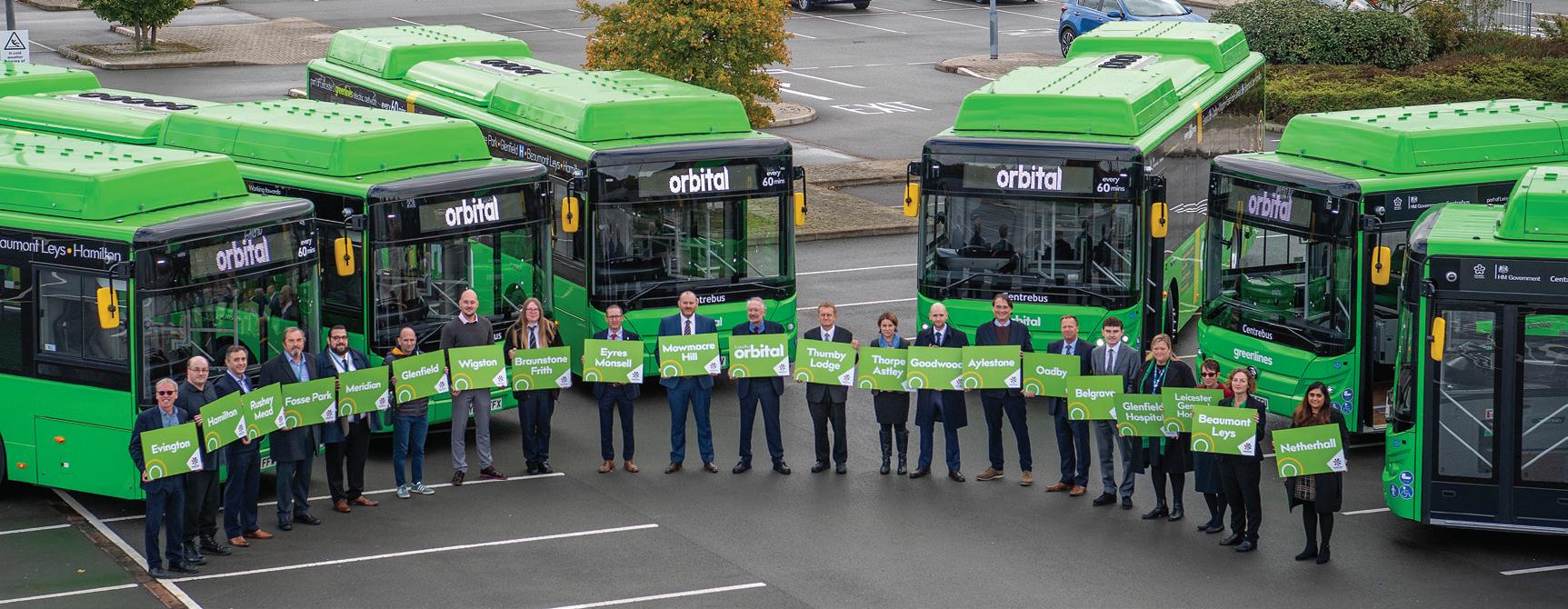
experience
true
ISSUE 275 21 OCTOBER 2022
NEWS, VIEWS AND ANALYSIS FOR A SECTOR ON THE MOVE
“I’m beginning to wonder whether the £1.2bn funding for BSIPs is now at risk” Roger French
2022 finalists revealed Stagecoach entries dominate shortlist10
TOCs show
LNER leads way in rebuilding patronage06 Lessons from the Covid
Jonathan Bray on what we learnt16 Could SQRs squash
customer care? Alex Warner warns against rigid system18 Black History Month Nafisa Nathani urges us to get involved20 NEWS COMMENT
LEICESTER LAUNCH A new electric bus service taking passengers on an orbital route connecting key sites around Leicester has been launched, the first ZEBRA funded project to be delivered in the country (see page 12 for full story)
NEWS COMMENT COMMENT FORTEVERYNIGHT
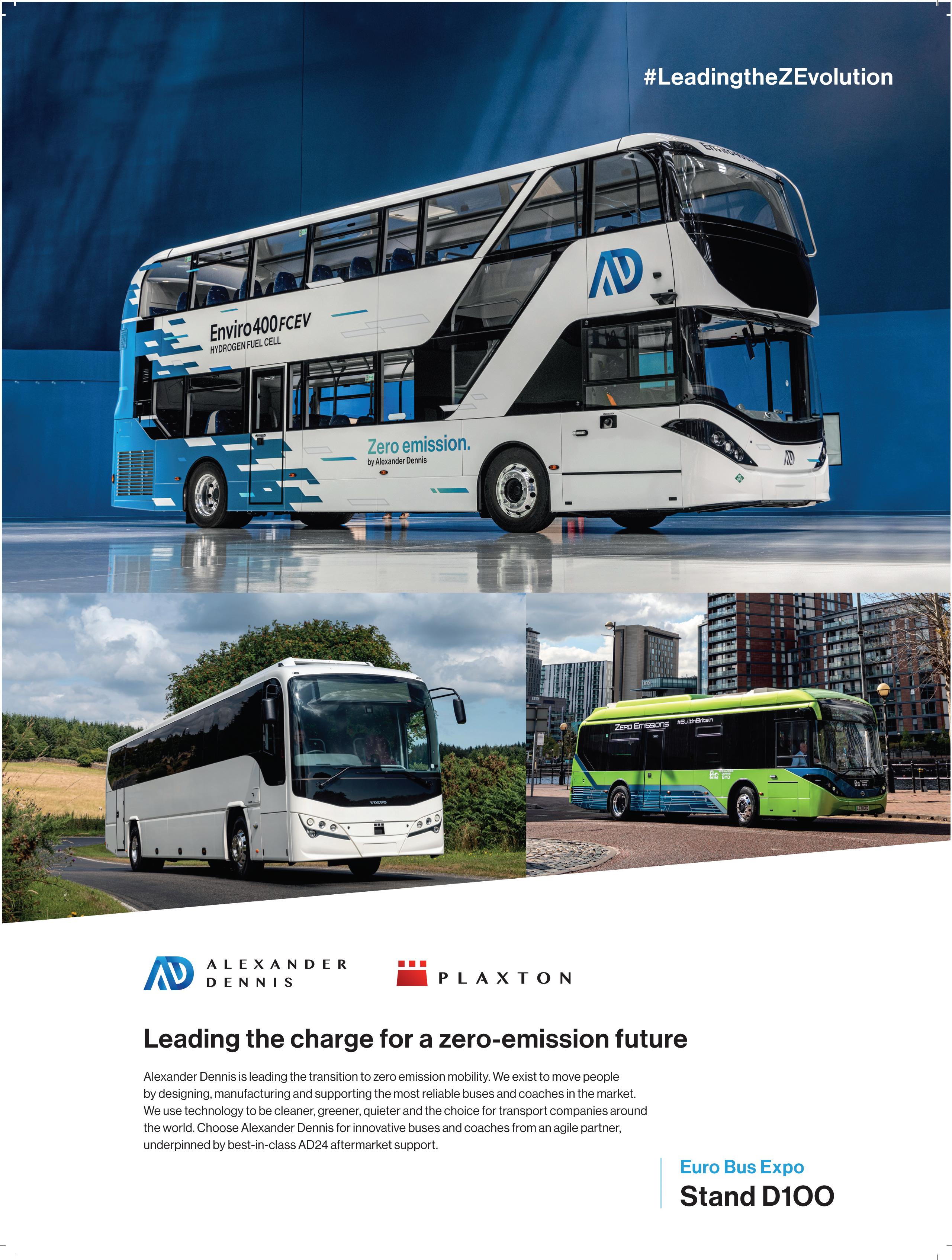
If DfT must make savings,start with road projects
Despite shelving much of his predecessor’s disastrous mini-budget, experts believe that the new chancellor, Jeremy Hunt, still faces a black hole of up to £40bn in the public finances. Paul Johnson, director of the Institute for Fiscal Studies, says there are no “easy options” and the chancellor will still have to make “scary decisions” in his October 31 ‘Halloween budget’. The Resolution Foundation warned spending cuts could be as deep as those after the 2008 financial crisis.

“It is hard to see which of the big chunks of spending - health, pensions, welfare, education and defence - can be cut,” Johnson observed. Transport secretary Anne-Marie Trevelyan is therefore going to face immense pressure to offer up savings.
Hunt acknowledged the importance of capital investment this week in parliament, but will that extend to delivering Northern Powerhouse Rail in full? Or could this pledge go the same way as others made by Liz Truss this summer during her campaign to become prime minister?
Could HS2 be at risk, or the first round of Bus Service Improvement Plan funding? Not long ago it would have seemed unthinkable and it should remain so. Instead, the government should rethink the billions of pounds it plans to spend on road-building projects. Truss has asked Trevelyan to accelerate these traffic-generating schemes which conflict with the government’s ambitions for the decarbonisation of our transport network. If the DfT must contribute savings, start there.
IN THIS ISSUE
13
LNER URGES MOTORISTS TO SWITCH ONE JOURNEY
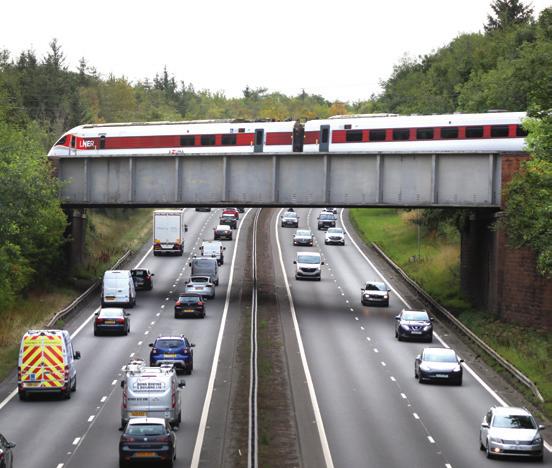
Intercity operator LNER has teamed up with researchers from UCLto urge people planning last-minute leisure trips to take one less car journey this year.The move aims to show the collective“green good” that such an initiative will do.
ORGANISATION
PAGE
Abellio 10 Arriva 10
ASLEF 6 AvantiWest Coast 6,7 c2c 6
CPT 4,8 CrossCountry 6 East Midlands Railway 6 Eversholt Rail Group 4
FirstGroup 7,10 FirstWest of England 8 GMB Union 5 Go-Ahead Group 7,8,10 GoviaThameslink Railway 6 Grand Central 6 Grant Palmer 5 Great British Railways 7 HullTrains 6 LNER 6 Lumo 6 McGill’s Bus Group 4 National ExpressWest Midlands 5 Network Rail 6
Nottingham CityTransport 5 Office of Rail and Road 6 Oxford Bus Company 8 RMTUnion 6 ScotRail 4,6
Southeastern 6 SouthWestern Railway 6 Stagecoach East
Stagecoach Group 10
Stagecoach North East 5
Transport for London 9 Transport forWales
Transport forWest Midlands 5 Transport Scotland 4
West Midlands CombinedAuthority 5
15OXFORDSHIRE SPEARHEADS NEW TECH
Oxfordshire has become the first county in the UK to adopt pioneering ethical technology designed to help reduce single car journeys and build a zero-carbon public transport network. The technology has been provided free to the county byZipabout.
22
H EADING N ORTH TO SO LVE LEVE LL ING U P
Levelling Up presents as many problems and opportunities as travelling between the North and South.Where do we start?
NickRichardson says while the aims are laudable,journeys everywhere have been challenging lately.
25
M INISTERS NEED TO C L ARIFY THE POSITION
OurWhitehall insider imagines what’s going on inside the minds of the mandarins at Great Minster House, home of the Department forTransport, and writes:“The speculation about the rail reforms needs to be brought to an end as a matter of urgency.”
Robert Jack Managing Editor
PASSENGER TRANSPORT editorial@passengertransport.co.uk forename.surname@ passengertransport.co.uk Telephone: 020 3950 8000 Managing Editor & Publisher Robert Jack Deputy Editor Andrew Garnett Contributing Writer Rhodri Clark Directors Chris Cheek, Andrew Garnett, Robert Jack OFFICE CONTACT DETAILS Passenger Transport Publishing Ltd PO Box 5496, Westbury BA13 9BX, UNITED KINGDOM Telephone (all enquiries): 020 3950 8000 EDITORIAL editorial@passengertransport.co.uk ADVERTISING ads@passengertransport.co.uk SUBSCRIPTIONS subs@passengertransport.co.uk ACCOUNTS accounts@passengertransport.co.uk Passenger Transport is only available by subscription. Subscription rates per year; UK £140 (despatch by Royal Mail post); Worldwide (airmail) £280 The editor welcomes written contributions and photographs, which should be sent to the above address. All rights reserved. No part of this publication may be reproduced in whole or in part without the publisher’s written permission. Printed by Cambrian Printers Ltd, The Pensord Group, Tram Road, Pontllanfraith, Blackwood, NP12 2YA © Passenger Transport Publishing Ltd 2022 ISSN 2046-3278 SUBSCRIPTIONS HOTLINE 020 3950 8000 PASSENGER TRANSPORT PO Box 5496, Westbury BA13 9BX 020 3950 8000 editorial@passengertransport.co.uk CONTENTS www.passengertransport.co.uk 21 October 2022 | 03
5
6
REGULARS NEWS 04 ENVIRONMENT 12 INNOVATION &TECH 15 COMMENT 16 GRUMBLES 25 CAREERS 26 DIVERSIONS 28
HAVE YOUR SAY Contact us with your news, views and opinion at: editorial@passengertransport.co.uk
Scotland braced for bus cuts after funding ends Emergency support ended on October 9, despite warnings
FUNDING
Widespread cuts to bus services are predicted after the Scottish Government’s emergency support for the sector to recover from the pandemic came to an end.
The government introduced its Network Support Grant (NSG) in April, replacing the Bus Services Operators’ Grant and its Covid-19 support funding. The new arrangement included NSG+ until October 9, designed as temporary support to reflect reduced passenger numbers compared with 2019.
As October 9 approached, transport minister Jenny Gilruth made clear that the government would not provide a further tranche of temporary support but convened a Bus Taskforce to discuss the way ahead.
Ralph Roberts, chief executive of McGill’s Group, told Passenger Transport that the Scottish Government had done a good job throughout the pandemic by maximising the number of bus services available to the public.
‘PAY AS YOU GO’
FLEET AGREEMENT
ScotRail deal with Eversholt reduces costs
ROLLING STOCK
ScotRail has reduced the cost of having a larger fleet than it requires for its usual operations by negotiating a “Pay as You Go fleet” agreement for six Electric Multiple Units (EMUs).
Some train operating companies
However, he added: “The ending of the NSG+ scheme will now unfortunately mean widespread cuts to services and job losses.
“There is a wider question that is now coming home to roost. Decades of public policy that has side-lined bus as a mode, causing the industry to lose vital productivity, pushing up costs and seeing falling ridership, has meant that the industry was already weakened going into the Covid pandemic. We are not just dealing with the legacy of Covid, we are dealing with the legacy of the private car being central to planning and roads policies for 50 years”.
CPT Scotland director Paul White said: “CPT Scotland continues to engage with the transport minister to make the case for a continuation of NSG+. Meanwhile, we are collaborating with government through the newly formed minister-led Bus Taskforce to address the challenges
facing bus operators and hope that this forum will affect change on issues such as patronage growth, driver shortages, congestion and rising costs.
“However, while this work continues it is critical that the Scottish Government supports the bus network through NSG+, mirroring similar commitments by the UK and Welsh governments. Failure to do so would force many operators to consider actions such as service reductions and fares increases at a time when we want to be growing bus use and protecting our passengers from the cost of living crisis.”
A Transport Scotland spokesman said Gilruth had reconvened the taskforce in a bid to better support the sector in its continued recovery from the pandemic.
“The minister has made clear her intention to engage the UK Government in this work - noting the reserved competencies in relation to Brexit impact on the
labour market and fuel costs. It was certainly disappointing that no UK Government minister was able to attend.
“The minister [Gilruth] undertook to urgently consider any further support that might be available within budgets, but this has to be undertaken in line with the Scottish Government’s Emergency Budget Review.”
He pointed out that the government was investing £300m annually to deliver the UK’s only free bus travel scheme for all children and young people under 22 as well as its scheme for disabled people and everyone over 60. More than 2.3 million people were eligible for free bus travel.
Graham Simpson, Conservative MSP for Central Scotland, said the ending of NSG+ could cost more than 200 jobs, while 50 routes could be cancelled entirely and services in some areas could be a cut by more than a third.
“The Confederation of Passenger Transport Scotland estimates that it will cost £44.8m to extend the grant for six months, and its modelling shows a potential underspend of £79m for the concessionary travel scheme and of £84.5m for the under-22s scheme. The bus industry is teetering on the edge and, as I have just demonstrated, the Scottish Government has the money, so when will it act?”
have more units than they currently need because they entered into leases before the pandemic but are currently operating fewer or shorter trains while passenger numbers recover. Eversholt Rail Group has agreed that six of its EMUs can be parked out of use but are available for ScotRail to call upon if needed.
David Lister, ScotRail’s engineering director, told the ScotRail board in August that the operator would only
pay for the six PAYG Class 320 EMUs when it required the use of the units. “In addition to lease savings, due to lower mileages on the 320/4 fleet there will be reduced costs in EC for T [traction electricity], track access and maintenance costs. Further evaluation is required to quantify these additional savings.”
The financial value of the lease cost savings is redacted in the version of the report released following a
Freedom of Information Act request. The agreement has also helped Eversholt to accelerate its heavy maintenance programme for the Class 318 EMU fleet. The agreement was amended to enable one Class 320 to be swapped for a Class 318, which allows work to proceed in Kilmarnock on two units at once. Originally only one unit was planned to be out of service for the programme at any time.
“The ending of the NSG+ scheme will now unfortunately mean widespread cuts to services and job losses”Ralph Roberts
NEWS ROUND-UP 04 | 21 October 2022 www.passengertransport.co.uk
TfWM saves routes but warns on funding Some supported routes saved as TfWM alters funding criteria
NETWORKS
The West Midlands Combined Authority has agreed to continue funding at least 78 of 114 bus service contracts that are regarded as socially necessary. The decision follows a review of both commercial and subsidised bus services across the region.
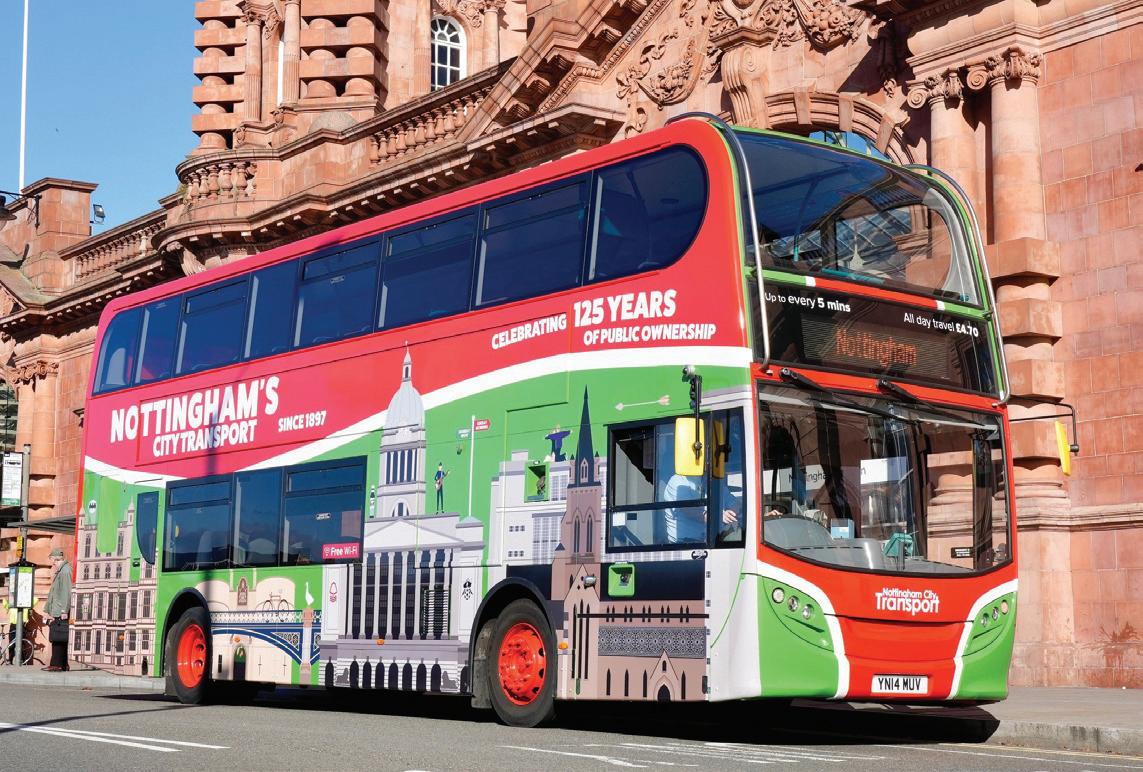
The decision to continue funding has been made possible after members of the Transport for West Midland’s transport delivery committee agreed to relax the value for money criteria and provide a £0.8m increase in the annual subsidy - taking the total for 2023/24 to £16.3m.
Various mitigation options will now be explored in an attempt to significantly reduce the services at risk. These include national funding from the government’s Local Transport Fund and local
GRANT PALMER TAKES ON ROUTES
Stagecoach East cuts allow independent growth
NETWORKS
Bedfordshire-based bus operator
Grant Palmer is to take on two routes axed by Stagecoach East in a cull of services announced last month (PT274). The family-owned independent will take on Routes 72 and 73 from October 31. They will operate to a revised timetable with buses operating six days a week, every hour between Bedford and Sandy with further extensions to Potton and Biggleswade.
funding from the region’s Bus Service Improvement Plan. Transport for West Midlands has also floated options for demandresponsive transport services.
“There is no doubt the industry is struggling,” said Pete Bond, TfWM’s director of integrated transport services. “We have sadly lost five of our smaller operators since the start of the pandemic. As a transport authority, we need to target our limited resources where they can make the most difference and, using our value-for-money criteria, protect the taxpayer.
“It is an incredibly difficult situation, but we are pleased that by adjusting our rules we have been able to reduce the impact of the review and will be looking for
ways to extend existing services or introduce alternatives to cover some areas.”
In his report to members Bond highlighted some of the region’s issues. Although patronage in the first week of September 2022 had recovered to an average of 84% of pre-Covid, at present less than 70% of the region’s bus network is considered commercial. Bond said National Express West Midlands (NXWM) has “shown its confidence in the further recovery by proposing to maintain around 90% of their pre-Covid mileage”.
But this was being hampered by reductions in a lot of highfrequency services as a result of staff shortages. In early October around 7% of planned mileage was not operated by NXWM as a result of this particular problem and the operator reported its driver levels are around 10% below the required establishment. Sickness levels are also around 4% higher than normal. TfWM
has asked operators to introduce more processes that ensure passengers are informed of cancellations.
“When driver numbers increase NXWM will look to increase some frequencies again, but the concern will be if these are implemented at the expense of more marginal routes across the network which would result in further pressures on the tendered bus network,” said Bond. “This is a risk also because changes to these services tend to impact the elderly, the more isolated, and the less well-off in the region, and remove critical elements of maintaining a comprehensive network.
“Any further changes or commercial de-registrations will not be able to be absorbed into TfWM budgets without additional government support or regionally committed funding.”
Andy Street, the mayor of the West Midlands, has announced bus fares will be frozen in the region at their current prices until 2025. He said the price freeze would help address the cost of living crisis and the move will be supported by funding from the region’s successful BSIP.
MORE STRIKE DATES REVEALED
Sunderland dates as Arriva looks to settle Kent dispute
INDUSTRIAL RELATIONS
The GMB union has announced two new strike dates for its dispute at Stagecoach North East’s Sunderland depot. Almost 200 bus drivers will take part in 24-hour walkouts on October 28 and 31. GMB claims the operator has offered a 4% deal with 2% to follow later in the year.
Meanwhile, Arriva has settled its dispute with Unite in Kent with strike action planned this week suspended awaiting the outcome of a ballot.
HAPPY BIRTHDAY, NCT Nottingham City Transport is celebrating 125 years of public ownership with a commemorative bus that “celebrates everything that makes Nottingham great and has more than 20 references to our city”.
“Any further changes or commercial de-registrations will not be able to be absorbed into TfWM budgets”
“There is no doubt the industry is struggling” Pete Bond, TfWM
www.passengertransport.co.uk 21 October 2022 | 05
InterCity TOCs shows strongest recovery East Coast operators lead the way in rebuilding patronage
COVID RECOVERY
New statistics from the Office of Rail and Road show a strong recovery in long distance patronage, with two East Coast Main Line (ECML) operators exceeding their pre-pandemic passenger numbers.
Across the National Rail network, 332 million passenger journeys were made between 1 April and 30 June, equating to 75.8% of the journeys during the same period in 2019. The ORR notes that strike action substantially reduced services on three days in late June.
ScotRail had the weakest relative passenger numbers, at 61.4%, but was affected by Aslef strikes during the quarter. It was not in dispute with the RMT at the time, but the RMT’s strike on Network Rail prevented most ScotRail services from operating on the three strike days in June.
Open access operator Grand Central tops the league table, with 112.7% of its pre-pandemic passenger numbers, followed by LNER, with 106.4%.
Hull Trains, also on the ECML, recorded 97.8%. This strong recovery is despite the addition of a third open access operator, Lumo, on the ECML since 2019.
East Midlands Railway recorded 98.4% of its prepandemic passengers during the quarter. Avanti West Coast, however, recorded 73.9% and CrossCountry 66.6%.
The ORR said the long distance sector had a relative usage of
84.8%, regional 73.0% and London and South East (LSE) 75.5%. However, the London and South East statistic is influenced by a large increase in TfL Rail passenger numbers since 2019, including the first users of the core Elizabeth Line tunnels which opened in May. Relative usage was below 70% on Govia Thameslink Railway, Southeastern, South Western Railway and c2c.
Chris Cheek, editor of Passenger Transport Monitor, said the overall picture was good news. “This is the highest number of passengers since before the pandemic, but then it should be, because this is the first time when there were no Covid restrictions.
“It’s quite clear that the InterCity companies are doing OK, apart from CrossCountry, whereas the commuter ones aren’t.” This reflected the resurgence of leisure travel in particular. “Business [travel] may be better than we had feared and the yields are holding up.”
His analysis of the spreadsheets behind the ORR’s statistics showed that average passenger journey length in the InterCity sector was about 160km, only 1.3% lower than in 2019, whereas on LSE it was about 8% lower. He said shorter distance commuting had held up better than longer distance, possibly because people who lived further out from
London and other large cities had more flexibility to work from home than those living in suburbs. London Overground, which is focused on short journeys, had a relative usage of 88.1% in the first quarter of 2022-23.
Cheek said that CrossCountry’s weak relative usage was partly down to its pre-pandemic popularity for commuting into cities on its network, particularly Birmingham and Leeds. The operator had not restored its pre-pandemic frequencies, and passengers had alternative services available on key segments such as Leeds to Sheffield.
Transport for Wales has previously indicated that its services from South Wales to Chester or Crewe have seen additional usage resulting from CrossCountry’s reduced frequency north of Bristol.
Cheek contrasted the recovery of Avanti West Coast with that of the InterCity operators on the ECML. “Might this be an indication that competition might be a good thing?”
Another difference was that LNER was directly owned by the UK government. “The word is that the TOCs that are directly owned are left alone to get on with it.” On the other hand, the Department for Transport was tending to “micro-manage” the other TOCs, he said.
David Horne, LNER’s managing director, said: “At LNER we are proud to lead the industry when it comes to welcoming people back to rail. For the past five consecutive quarters we have seen more and more passengers returning to our services.
“We believe our customer service and digital innovations are a key part of that success, offering people first-class customer service, greater choice and flexibility, and that work continues.”
NEWS ROUND-UP 06 | 21 October 2022 www.passengertransport.co.uk
RELATIVE USAGE COMPARED WITH THREE YEARS AGO April to June 2022, and as a percentage of April to June 2019 (Source:
ORR)
GRAND CENTRAL SCOTRAIL HULL TRAINS HEATHROW EXPRESS CROSSCOUNTRY CHILTERN RAILWAYS SOUTHEASTERN SOUTH WESTERN RAILWAY GOVIA THAMESLINK RAILWAY WEST MIDLANDS TRAINS C2C TRANSPENNINE EXPRESS CALEDONIAN SLEEPER GWR AVANTI WEST COAST TfW RAIL GREATER ANGLIA NORTHERN TRAINS EAST MIDLANDS RAILWAY LNER LONDON OVERGROUND 106.4% MERSEYRAIL 112.7% 98.4% 97.8% 88.1% 83.3% 82.2% 76.7% 76.6% 76.6% 74.5% 73.9% 71.1% 69.4% 68.7% 68.0% 67.7% 67.1% 66.6% 66.4% 61.4% 65.3% InterCity London & SE Regional
CONTRACTS
Embattled train operator Avanti West Coast has secured a shortterm contract extension from the Department for Transport which will require it to make significant improvements to services.
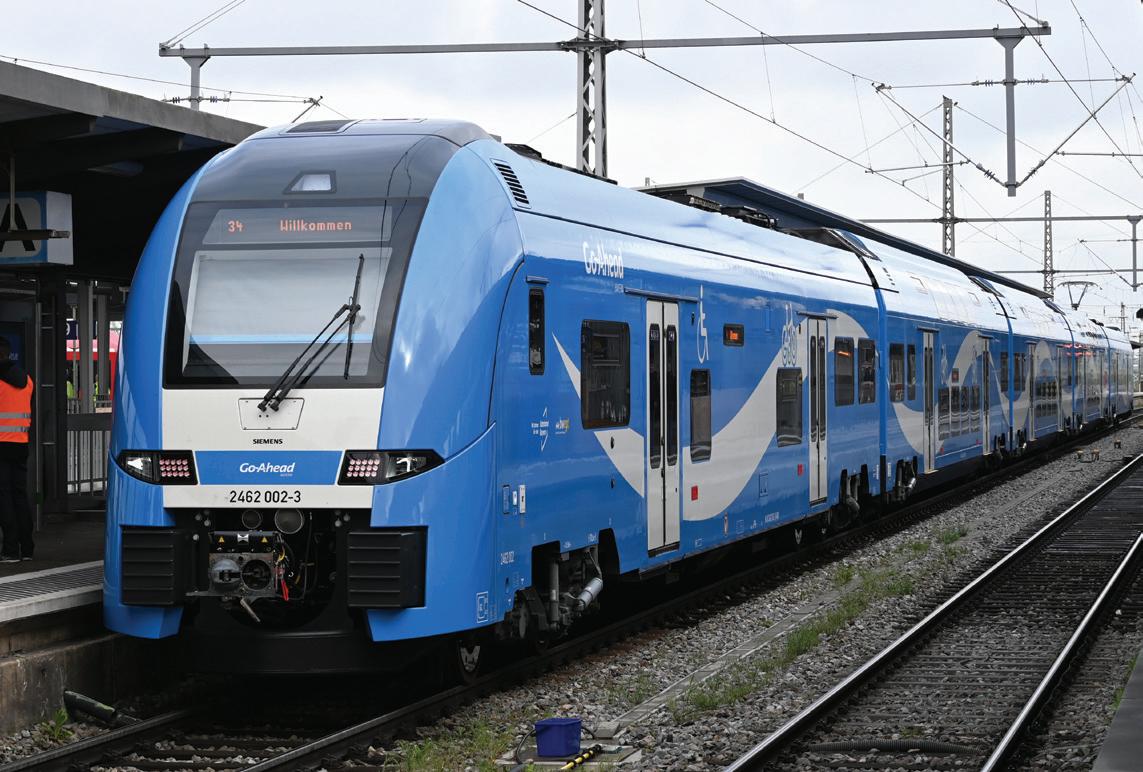
Transport secretary Anne-Marie Trevelyan has challenged Avanti West Coast to “deliver the urgent increase in services required”.
The DfT announced the new contract just days before Avanti West Coast’s existing Emergency Recovery Measures Agreement was due to expire. The contract will now run until the end of March 2023 under broadly the same terms and conditions. Avanti said discussions are ongoing with DfT regarding a longer-term National Rail Contract.
“We need train services which are reliable and resilient to
“Services on Avanti have been unacceptable and while the company has taken positive steps to get more trains moving, it must do more to deliver certainty of service to its passengers.
“We have agreed a six-month extension to Avanti to assess whether it is capable of running this crucial route to a standard passengers deserve and expect.
The DfT said the 11-week contract was designed to provide Avanti with the opportunity to improve its services: “The government will then consider Avanti’s performance while finalising a National Rail Contract that will have a renewed focus on the resilience of train services and continuity for passengers.”
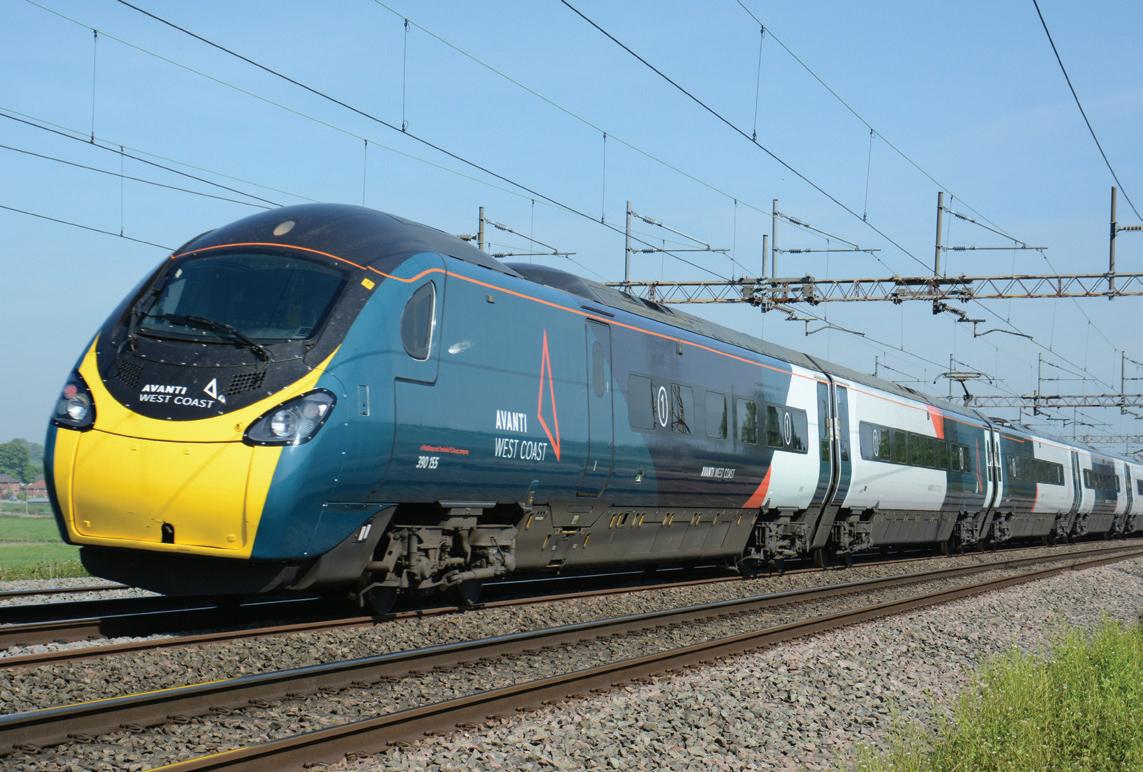
In an apparent barb at Avanti West Coast management, the
FEARS OVER GBR CREATION
Minister says government will ‘take stock’ on plans
RAIL REFORM
There are fears about plans for rail reform following speculation that the creation of Great British Railways may be slowed significantly following the departure of Boris Johnson as prime minister and Grant Shapps as transport secretary.
Media reports have suggested there have been clashes over the transfer of timetabling and ticketing to GBR and what (if any) revenue risk would lie with operators.
DfT claimed that the problems Avanti had faced in recent months stemmed from “old working practices that mean shifts are often covered by existing drivers volunteering to work above their 35 contracted hours”.
“This antiquated practice shows just how urgent it is for us to modernise our railways, so passengers benefit from reliable services that don’t rely on the goodwill of drivers volunteering to work overtime,” added the DfT.
However, the DfT said the train operator appears to have begun to get a grip with the news that nearly 100 additional train drivers will have entered formal service this year between April and December.
“This has meant the company has begun to add more services as new drivers and those who need re-training become available to work,” said the DfT.
In a statement, FirstGroup chief executive Graham Sutherland said: “Today’s agreement allows our team at Avanti West Coast to sustain their focus on delivering their robust plan to restore services to the levels that passengers rightly expect.”
However, speaking at the Rail Forum Conference in Derby last week, new rail minister Kevin Foster suggested that the speculation was unfounded.
“There’s a new government,” he said. “We’ll take stock, particularly around the legislative agenda. I think we see in the not-too-distant future myself and the secretary of state will perhaps set out a little bit more detail on where we see the vision.”
Foster said there were challenges to reform and they include resolving “workforce issues” and improving delivery. Foster added he was also keen to broaden private sector involvement to improve delivery.
GO-AHEAD DOUBLE DECKERS FOR BAVARIA Go-Ahead will take on operation of six routes previously run by DB in Bavaria on December 11. It will use new double deck Siemens Desiro HC trains on the German services.
Avanti told to improvewith short extension ‘We need train services which are reliable,’ says new transport secretary
modern-day life,” said Trevelyan.
Avanti’s contract will now run until the end of March 2023
www.passengertransport.co.uk 21 October 2022 | 07
“We need train services which are reliable and resilient to modern-day life”
Think tank backs cut price bus fare scheme
IPPR says it is time to cut the cost of daily bus travel
FARES
The Institute for Public Policy Research has called on the government to go further than the planned £2 cap on bus fares in England this winter in a bid to support low income households.
The think tank suggests that a range of interventions could be considered. These range from expanding current free concessionary travel arrangements to include young people and those on Universal Credit to free bus travel for all.
“Rising bus fares have disproportionately impacted those on the lowest incomes, as they are the most likely to use these services,” said IPPR. “Since
BUS DRIVER BONUS
Market-leading bonuses aim to tempt jobseekers
RECRUITMENT
While the national shortage of bus staff is well known, the difficulty in recruitment has perhaps been highlighted by the news that Go-Ahead subsidiary Oxford Bus Company (OBC) has increased its signing-on bonus for bus drivers from £1,000 to what it claims is a market-leading £3,000.
The company has made the decision to increase the bonus payments in a bid to further encourage job seekers to become bus drivers. OBC said it has also run a series of proactive recruitment campaigns locally to boost its
2013, bus users have seen bus and coach fares rise faster than average wages, rail fares, and the cost of motoring. Deregulation and lack of appropriate, long-term funding for the bus network has failed those who have limited access to alternative transport options.”
It said that while fare reductions alone may not lead to reduced car usage, improving bus services, investment in active travel and making the use of more polluting vehicles less attractive (such as Clean Air Zones) are all needed.
“Fare reductions will help deliver a fairer transport system and ensure that climate policies
are perceived as fair to all income groups - not just those who can afford to purchase electric vehicles,” IPPR added.
In response, it has advocated a one-year, England-wide (including London) emergency scheme to reduce the cost of bus fares.
“Alternatives to fare-free travel could include capping a single ticket at £1 or day ticket at £1,” IPPR said. “After a year, a longerterm funding settlement to support lower fares should be agreed with local transport authorities.”
It estimates that free travel for all would cost up to £2.3bn per annum but it would boost bus patronage
by up to 1.05 billion journeys each year. Expanding concessionary arrangements to include young people under 25 and those claiming Universal Credit would cost up to £0.5bn and would generate up to 0.36 billion journeys each year.
Meanwhile, IPPR also costed a range of reduced alternatives: a scheme that capped bus travel to £1 each day would cost up to £1.7bn a year and generate 0.84 billion journeys; a £1.50 daily cap would cost up to £1.4bn and generate 0.74 billion journeys; a £1 cap per trip would cost £0.9bn and generate up to half a billion journeys; while a £1.65 cap per trip would cost up to £0.3bn and generate up to 0.14 billion journeys per year.
“At least an annual scheme is required,” concluded IPPR. “To best target resources, it may be appropriate to offer a significant extension in concessionary schemes alongside a new flat fare for day trips - this would ensure that the benefits from this intervention were targeted at those who need them most.”
workforce.
The company first introduced the bonus scheme in October 2021 and payments are made when drivers hit four key milestones: driving on the road independently, passing probation and then at six and 12 months after passing probation. The spread of the payments is designed to improve driver retention rates and to reward dedication to the bus company.
Luke Marion, OBC’s interim managing director said: “Bus and coach drivers are vital to community cohesion, as public transport is key to connecting people, reducing congestion and improving air quality.
“Currently there is a national shortage of drivers and recruitment is challenging. Unfortunately, this is having an impact on services
at times, but we have adjusted timetables to manage the situation and are making progress in our proactive recruitment of drivers. We hope that by continuing to strengthen our campaign it will help us reach the volume we need.
“Our PCV driver retention bonus is now market leading and we have also simplified the recruitment process to make it quicker and easier to become a bus driver.
Nationally, 9.3% of bus driver roles are vacant across the UK, according to the Confederation of Passenger Transport.
Earlier this month First West of England revealed it was short of 200 bus drivers. The operator said it had put “significant effort” into recruitment and had increased pay by 14% earlier in the year.
GO-AHEAD DEAL
COMPLETED
Group will remain a standalone subsidiary
ACQUISITIONS
The sale of Go-Ahead Group to a consortium led by Australian transport group Kinetic has been completed. The deal doubles the size of Kinetic and it is planned that Go-Ahead will operate as a standalone subsidiary.
With completion of the deal, Go-Ahead has confirmed three non-executive directors of the group - David Blackwood, Harry Holt and Leanne Wood - have stepped down from the board. Former Eurostar chair and Caledonian Airways managing director Clare Hollingsworth remains as chair.
“To best target resources, it may be appropriate to offer a significant extension in concessionary schemes”
£3,000
NEWS ROUND-UP 08 | 21 October 2022 www.passengertransport.co.uk
Dynamic bus flags aimto boost bus patronage
Test bed bus route receives bus stop information screens
CUSTOMER SERVICE
Transport for London has confirmed further trials on Route 63 between King’s Cross and Honor Oak Park which is rapidly emerging as a testbed for planned improvements to the capital’s bus network. Earlier this month outgoing transport commissioner Andy Byford confirmed TfL was rolling out live bus information to several stops on the route.
“Dynamic bus flags have been installed at five stops,” he told TfL board members. “These small screens display Countdown-style live arrival information at stops without shelters and power and mean that 46 stops along the route now provide customers with
TUBE PATRONAGE
MILESTONE PASSED
Daily passenger numbers surpass pre-Covid figures
RECOVERY
Transport for London revealed the passing of a significant milestone on October 6 when London Underground recorded 3.41 million passenger journeys - making it the network’s busiest day since March 2020.
The breakthrough came as TfL group finance director Patrick Doig told board members on October 12 that patronage across all TfL networks continues to grow, reaching 81% of pre-pandemic levels between April 1 and August 20.
“This was up from 77% in the prior period and from 68% at the end of last year,” he said. “Tube journeys
real-time information.”
Byford said that following upgrades to some bus shelters along the route, trials are now underway of two new types of digital information screens at 18 stops. He continued: “Research will evaluate the overall impact of the various improvements to understand those with the greatest potential to stimulate growth in bus travel by making the bus network an attractive option, and so ensure revenue is maintained and reinvested into further improvements to the network.
“Research will evaluate the overall impact” Andy Byford
have increased to 78% and are broadly in line with budget - journeys are slightly lower than expected from impacts of industrial action across National Rail network and London Underground. Bus journeys are 81% of pre-pandemic levels, slightly lower than budget.”
Reiterating comments made by Rachel McLean, Crossrail’s chief financial officer, last month (PT274), Doig said patronage on the Elizabeth line had been above expectations since the opening of full services on May 24. “Journeys are 14 million better than budget in the year to date, with income £20m higher than expected,” he added.
Meanwhile, Doig said that while the recently agreed financial settlement with the government allowed TfL to move away from a managed decline
“Our bus operations and network management teams have achieved these enhancements in a cost-efficient way, and we are expecting to pay back the modest investment quickly, to help us attract more customers to the network as well as make buses more financially sustainable.”
Meanwhile, Byford told board members TfL had received more than 21,500 responses to its consultation for the controversial Central London Bus Review.
The review proposed changes to 78 bus routes and the complete withdrawal of a further 16 (PT266).
“We are very pleased with the significant number of responses covering a range of views to take on board, and we thank everyone who took part,” he said. “We are now considering the feedback we received.
scenario for TfL services, further efficiencies would be needed.
“There remain significant risks to our financial position, including delivering the additional efficiency target of £230m over the next two years,” he said, adding that the alternative to not accepting the settlement would have been to move “even faster and harder on cuts”.
IN BRIEF
ZERO-EMISSION TARGET CUT
Transport for London has said it expects London’s bus fleet to be fully zero-emission by 2034three years earlier than previous targets. The capital’s bus fleet now has more than 850 zero-emission buses. TfL says the growth of the fleet will play a big part in meeting climate change targets.
TfL BUS LEADERSHIP DAY
Transport for London plans to host a bus leadership day later this year that aims to encourage the London boroughs to recognise the importance of buses in supporting the active travel and air quality aims of the Mayor’s Transport Strategy. TfL has also confirmed a budget has been set aside in the borough funding package to continue bus priority enhancements.
BUS PRIORITY PROGRESS
London’s bus priority team has refocussed Transport for London’s bus priority programme with it now aiming to deliver 25km of new bus lanes across London by March 2025, well ahead of the targets set out in the Bus Action Plan. Meanwhile, more than 1.2km of new and improved bus lanes have been delivered in the current financial year. TfL claims this has saved more than 4,000 bus passenger hours.
BORIS BUS REFURBS
October 6 was busiest day on Tube since early 2020
More than 90 New Routemaster buses have now received a mid-life refurbishment. Transport for London says the vehicles have a new moquette design that aims to help passengers identify priority seating. It is planned that more than 300 out of the full fleet of 1,000 buses will have been refurbished by the end of 2022/23.
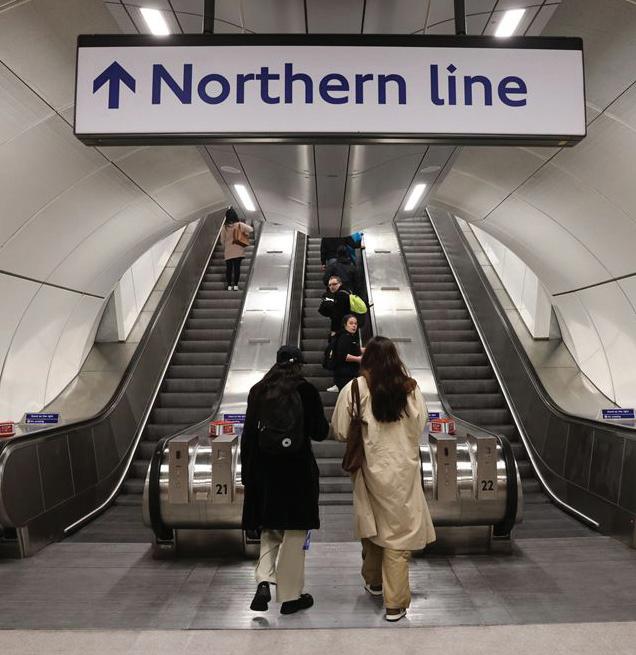
www.passengertransport.co.uk 21 October 2022 | 09
Stagecoach leads UKBus Awards shortlist
A total of 100 finalists have made the shortlist of this year’s prestigious UK Bus Awards, with the winners set to be announced on November 15
UK BUS AWARDS
The UK Bus Awards, the flagship national award scheme, has announced a 100-strong shortlist after another bumper year for entries.
After a pause over the last two years due to the Covid-19 pandemic, people, projects and bus operators will once again be competing for the top spots across 22 categories at an in-person presentation ceremony on November 15, at Troxy, London.
The judging process has included mystery travelling of the driver and operator finalists and face-to-face interviews with all of those shortlisted for the people awards.
Stagecoach, the UK’s biggest bus operator, received the highest
number of shortlisted entries (34), a third of all finalists. The group has been shortlisted in 17 award categories.
Carla Stockton-Jones, UK managing director, said: “It’s a real credit to our people that we have more shortlisted awards than any other operator this year. These awards reflect the hard work and professionalism of our teams right across the country, and their pride in serving our customers.”
The AIM-listed Rotala group received the second largest number of shortlisted entries (10), with Diamond Bus North West facing off against Abellio Bus in the Top City Operator category.
The Go-Ahead Group has seven finalists, compared to 21 when the in-person awards were last held in 2019, followed by First Bus and Abellio with six each.
Despite being one of the UK’s major bus operators, Arriva is
respresented by one finalistArriva London’s Brixton garage is one of six on the shortlist for the London Bus Garage of the Year.
Alan Millar, chair of the UK Bus Awards, said: “This shortlist of finalists represents the skills and talents of the industry. They range from small, family-owned businesses through to the very large multinational transport groups, including several entering for the first time. It’s pleasing to see our first in-person awards ceremony since 2019 will once again recognise and reward excellence across the board to find the very best in the business.
“There will be some tough competition too. We have been challenged by the sheer strength and creativity of the entries, especially within the people categories, all of which our independent team of judges reported as outstanding.
Millar added: “We can’t wait to bring the industry together once again to celebrate.”
The shortlisted entries cover 22 categories (see opposite). There is no shortlist for the Services to the Bus Industry Award is and the shortlist for the coveted UK Bus Operator of the Year is selected from the highest-scoring contestants of the Top City Operator, Top Independent Operator and Top Shire Operator Awards.
The ceremony will take place on November 15 at Troxy, London. Tickets are available now: www.ukbusawards.org.uk

“This shortlist of finalists represents the skills and talents of the industry”
NEWS UK BUS AWARDS www.passengertransport.co.uk
The in-person UK Bus Awards presentation ceremony will take place on November 15, at Troxy, London
SHORTLISTED ENTRIES FOR 2022 UK BUS AWARDS STAGECOACH GO-AHEAD 34 7 ROTALA 10 FIRST ABELLIO 6 6 10 | 21 October 2022
THE UK BUS AWARDS 2013 SHORTLISTWARDS 2022 SHORTLIST
BUS AND THE COMMUNITY, sponsored by Heathrow Diamond Bus North West, Bus depot on Weston Street
Ensignbus
Go North East
RATP Dev Transit London, Electric Bus Viewing
Stagecoach East Scotland, Sam’s Wellbeing on Wheels
Stagecoach Manchester, Forever Manchester
Stagecoach South East, The Friendship Bus
CULTURE CHANGE
Abellio Bus, Learning and Development Team
Go North East, One Team GNE
Stagecoach London, Let’s talk equality, diversity and inclusion
Stagecoach London, Safety Strategy Forum
Stagecoach South East, Service Delivery Team
Transdev, The Transdev Spirit
ENGINEER OF THE YEAR, sponsored by IRTE Mick Branigan, Diamond Bus NW
Darren Bull, RATP Dev Transit Ldn
Craig Mills, Stagecoach London
Jamie Stockton, Stagecoach Manchester
LEADER OF THE YEAR
Bill Daly, Stagecoach London
Ken Fennell, Abellio London
Joel Mitchell, Stagecoach SE
Samantha Teggart, Abellio London
Jim Thorpe, Uno
LONDON BUS GARAGE OF THE YEAR, sponsored by TfL Abellio London, Beddington
Arriva London, Brixton
Go-Ahead London, Putney Metroline, Uxbridge Stagecoach London, Bow Stagecoach London,
Lea Interchange
MARKETING
Cornwall Council, Cornwall Bus Fares Pilot Launch Diamond Bus North West, Saving Money for Salford Go North East, Jobs with Real Purpose Stagecoach South East, A Day in the Life series
Transdev, Transformation at TeamPennine
TOP NATIONAL BUS DEPOT, sponsored by Integrated Solutions Stagecoach Cumbria & North Lancashire, Barrow Stagecoach East Scotland, St Andrews
Stagecoach North Scotland, Portree
TOP CITY OPERATOR, sponsored by INIT Innovations
Abellio Bus Diamond Bus North West
TOP INDEPENDENT OPERATOR Ensignbus Grant Palmer Uno
TOP SHIRE OPERATOR, sponsored by Ticketer Blackpool Transport Stagecoach East Stagecoach East Scotland
TOP EXPRESS COACH OPERATION, sponsored by Volvo Oxford Tube RailAir and RailAir 2
UNSUNG HEROES, sponsored by Backhouse Jones Aafreeda Merican, Abellio Bus Glenn Oldman, Stagecoach Ldn Kolawole ‘Kola’ Obasa, Metroline Lesley Hester, Stagecoach Mcr Louise Sills, Stagecoach SE Steph Smith, Diamond Bus NW James Third, Stagecoach SE
SUPPORTING THE CUSTOMER EXPERIENCE, sponsored by Tracsis Cornwall Council, Cornwall Bus Fares Pilot Diamond Bus North West, Ticketing and Partnerships
Grant Palmer, Push Messaging Oxford Bus Company, Freeflow Nottingham City Transport and partners, Flexible Contactless Capping Transdev, Sky Class
TOP NATIONAL BUS DRIVER: THE CHRIS MOYES MEMORIAL AWARD, sponsored by Personal Group
Ama Adae-Bosmpra, Uno Darren Dalton, Preston Bus Grzegorz Ranis, Uno Gurnam Singh, Stagecoach West Jonathan Smallman, Nottingham City Transport
SUPPORTING THE ENVIRONMENT sponsored by CitySwift
Diamond Bus North West, New Vehicles for Manchester
First Glasgow, Electrifying Caledonia
First York, Biggest Zero Emission Park & Ride Fleet
Nottingham City Transport, Nottingham’s Green Euro Vl Fleet Stagecoach East, Big Switch Off Translink, Zero Emission Project
LUKE REES-PULLEY AWARD FOR TOP LONDON BUS DRIVER, sponsored by Luke Rees-Pulley Charitable Trust and TfL
Aliya Aleskerova, Metroline
Domingos Goncalves, RATP Dev Transit London
Koli Begum, Go-Ahead London
Kellie Heard, Stagecoach London
Mohamed Maow, RATP Dev Transit London
Nimish Jamnadas, RATP Dev Transit London
Poppy Owusu, Metroline
Wolfgang Chindamo, Metroline
BUSES FOR PLEASURE
Diamond Bus North West, 575A Go North East,
Toon Tour, Seasider X11 & X75
First Eastern Counties, Clipper Cabriolet
First South West, Exmoor Coaster
Stagecoach Cumbria & North Lancashire, Explore the Lakes by Bus Stagecoach East Midlands, Skegness Seasiders
Transdev, Greetings from Yorkshire
ROSCO AWARD FOR CONTRIBUTION TO SAFER DRIVING, sponsored by ROSCO Stagecoach East and Volvo Bus, Intelligent Speed Assistance
Stagecoach London, Safety Strategy Forum
Ticketer and Reliance Motor Services, Tailored Ticketer Road Restriction Alerts
YOUNG MANAGER OF THE YEAR
Ben Houghton, Stagecoach London
Daniel Bowden, Stagecoach East Midlands Hayley Russell, FlixBus Michelle Doyle, Stagecoach West Thomas Calderbank, Diamond Bus North West Zachary McAskill, Stagecoach Manchester
PARTNERING FOR DELIVERY: THE PETER HUNTLEY MEMORIAL AWARD
Cornwall Council and partners, Transport for Cornwall
First West Yorkshire and partners, Leeds Public Transport Investment Programme
ito World, Analyse Bus Open Data Leicester Bus Partnership Nottingham City Transport and partners, Nottingham Contactless, Transdev and Harrogate BID, The Freeway Approach
www.passengertransport.co.uk 21 October 2022 | 11
First ZEBRA funded project to be delivered
A new electric bus service has been launched by Leicester City Council and Centrebus to connect estates and suburbs on the city’s outer ring road
ELECTRIC VEHICLES
A new electric bus service taking passengers on an orbital route connecting key sites around Leicester has been launched.
The 30-mile Orbital service, which is the UK’s longest electric circular bus route, will connect estates and suburbs on the city’s outer ring road and beyond, with locations such as shopping centres, hospitals and other key transport infrastructure.
It is the latest addition to the city’s Greenlines electric network, and is the fifth new service to be launched using the new council-owned electric buses. The partnership project, with operator Centrebus, also includes a brandnew electric bus charging depot at the firm’s Thurmaston depot.
The six Yutong electric buses and charging depot have been partially funded (£1.21m) by the Department for Transport’s Zero Emission Bus Regional Areas (ZEBRA) scheme and combine to make the first ZEBRA funded project to be delivered in the country.
Launched at an event on October 13 at the Birstall Park and Ride depot, the new service replaces the 40 Circleline service and will come into operation on October 24. As the name indicates, the Orbital orbits the city’s bus network and is designed to help connect and integrate with other services within the Leicester Buses Partnership, making public transport more accessible and convenient for
residents and visitors.
Leicester deputy city mayor for transport, clean air and climate emergency, Cllr Adam Clarke, said: “The Orbital route is a very well-used service, and switching over to the latest electric vehicles means another significant part of the city’s public transport system will now benefit from cleaner, more modern buses.
“Launching the Leicester Buses Partnership back in April
has meant we’ve been able to work very closely with the city’s bus operators to bring forward projects like this to make topnotch public transport accessible to more people while being committed to tackle emissions and the climate emergency.”
David Brookes, director of Centrebus, added: “We have worked closely with our colleagues at the city council to introduce these state-of-the-art electric buses to the newly-named Orbital route.They’re the first electric buses in the country to hit the road funded through the government ZEBRA scheme which is testament to the speed at which the city council and our fellow partners have delivered this project.
ORBITAL’S FOUR PHASE PLAN
- PENDING FUNDING
PENDING FUNDING
“Together with the upgraded bus stop infrastructure and additional real-time information displays across the city, these buses will not only improve air quality but will encourage people to leave their cars at home and use public transport.”
With the route serving both Leicester General Hospital and Glenfield Hospital, University Hospitals of Leicester (UHL) director of estates, facilities and sustainability Michael Simpson said it would provide colleagues and patients an additional sustainable travel option.
“The service links to our Hospital Hopper service and is another step towards improving public transport in the city as well as supporting UHL on its mission to be greener by connecting our communities through greener, cleaner travel,” he said.
This is the first phase of the council’s plans to radically improve on the previous diesel Circleline service over the next two years, subject to funding available. The first phase includes six new fully electric buses together with on-board displays, real time information and contactless ‘best fare’ ticketing.
Leicester City Council has invested £2.11m in this project, with the aim of removing a predicted 177 tonnes of CO2 emissions per year and reducing operational costs by over £60,000 a year. Alongside new buses, there is also over £10m of planned bus priority works in future phases, supporting the city’s vision for a tram-style bus network serving the whole city.
PENDING FUNDING
By the end of the four phases, the route will involve 20 electric buses in total, running every 15 minutes around the city, allowing better connections, improved reliability and further integration with other cross-city services.
ENVIRONMENT 12 | 21 October 2022 www.passengertransport.co.uk
“We’ve been able to work very closely with the city’s bus operators”
Cllr Adam Clarke
PHASE 1 - OCTOBER 2022 New electric buses Fully branded buses Next stop audio-visual announcements ‘Tap on tap off’ best fare capping Real-time information displays at main stops Accessible bus stops with raused kerbs PHASE 2
Significant bus priority to improve reliability with up to six new bus lanes and nine junction improvements New bus shelters and real time information at more bus stops Traffic light signal priority for late buses
PHASE 3 -
Increase frequency to every 30 minutes Introduce an evening and Sunday service An additional six electric buses PHASE 4 -
Increase frequency to every 15 minutes Integrate with the Park and Ride sites An additional eight electric buses
LNER urges motoriststo switch one journey
Operator teams up with UCL to make environmental case
ADVOCACY
Intercity operator LNER is urging people planning last-minute leisure trips to take one less car journey this year by showing the collective “green good” it will do.
With more than two-thirds (69%) of British adults planning to travel expected to take a car journey this autumn, a total of 186,200 tCO2e of carbon emissions could be saved if each made just one journey by train rather than a car.
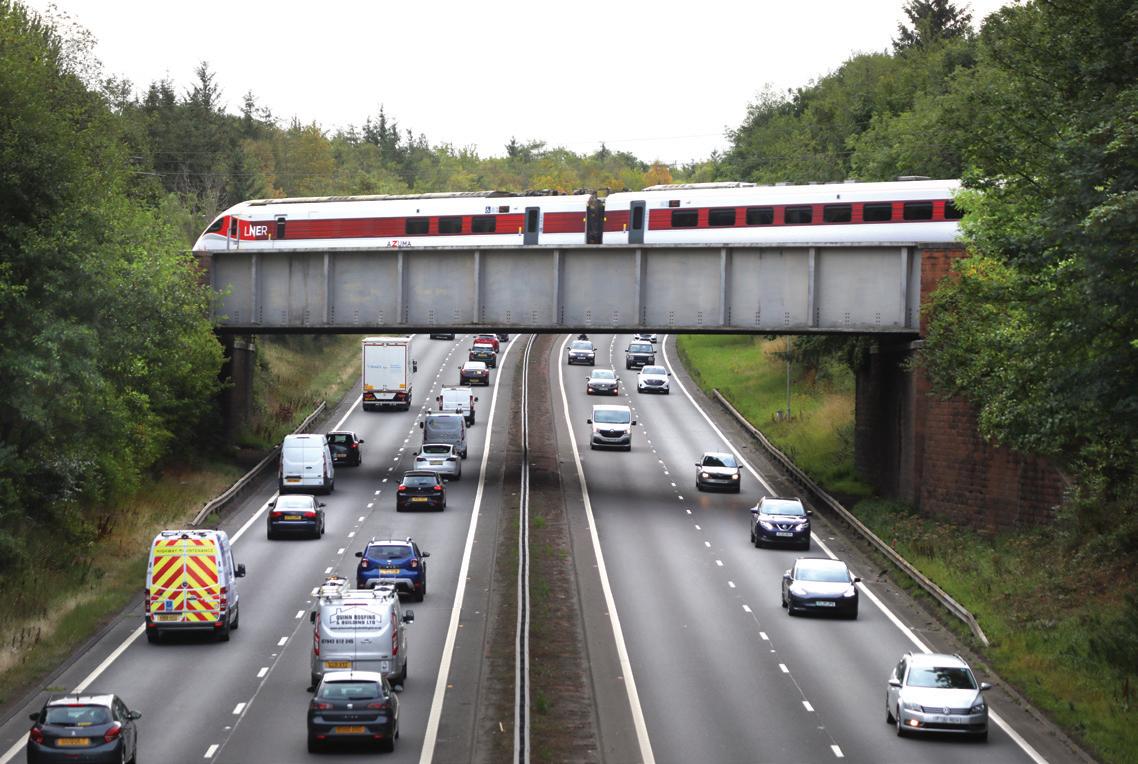
Working with experts from University College London (UCL) Energy Institute researchers, LNER has analysed the data on the impact that taking autumn excursions by car will have, with 25% of people taking more than one leisure trip this autumn in an attempt to seek a final holiday before the winter sets in. Switching just one leisure journey to train this autumn could result in a 28.4% reduction in total journey carbon emissions, and across one year could result in a 16.6% reduction of annual leisure travel emissions (1,099.63 million kgC02e).
Rather than make drastic lifestyle changes, British adults prefer to make more manageable changes, but 36% feel they don’t have enough knowledge about the impact small changes can have on the environment. There is a large appetite to change, with 59% of adults increasingly aware of the impact they have on climate change and almost one in three (30%) feeling overwhelmed with a sense of responsibility to
help support the environment by changing their lifestyle.
LNER is helping by showing people the difference they could make this autumn, just by switching one leisure journey to the train rather than by car. On average carbon emissions from cars are three times higher than that of a train, meaning the collective power of one small change could be a monumental shift.
Whilst some travellers may feel that a single journey will not make a difference, the collective impact of everyone changing just one journey would be huge - comparable to the filling Wembley Stadium 25 times with carbon emissions.
The research shows that 70% of adults are at least somewhat concerned about the environmental impact of travel and more than a third (34%) would like to reduce their carbon
footprint, but 28% feel that changing their travel habits will not have a large enough impact on the environment.
LNER’s carbon calculator helps people to discover the difference that a journey made by rail could have. For example, the calculator shows that a one-way journey between York and London produces just 12.34kg CO2e by train, whereas a journey by car would produce a 41.36kg CO2e.
Using the LNER carbon calculator will help those looking to change one journey to better understand how their small change will make a big difference. As almost two-thirds of adults (63%) feel that there should be more assistance to help people understand and calculate their carbon footprint, the carbon calculator is just one thing LNER has introduced to assist
customers in choosing a more environmentally friendly journey. Two-thirds (66%) feel that those responsible for travel should make it easier for travellers to be more sustainable, something which the carbon calculator seeks to achieve.
David Horne, managing director at LNER, said: “We know that being greener is hugely important but many of us aren’t sure on our role and how our individual actions can make a difference. As cars emit three times more carbon emissions than rail and with so many people planning on using the car for a leisure trip this autumn, we’re asking people to consider travelling by train just once to do their bit to cut emissions.
“Collectively we could save enough carbon to fill Wembley Stadium 25 times, which is a huge amount of carbon we could prevent from being emitted into the atmosphere.”
Professor Paul Ekins, professor of resources and environmental policy at the UCL Institute for Sustainable Resources, said:
“What our research has concluded is that small changes made by enough people really do make a difference. Just one journey switched from car or bus to train by everyone who takes a leisure trip in a year could reduce carbon emissions by over one million tonnes CO2, or 16.6% of emissions from leisure trips, or nearly 1% of all UK 2019 transport emissions. This is a really big contribution from just one small change in a year to people’s daily lives.”
There is progress, with adults being 5% less likely to take a leisure trip by car before the end of the year (60%) than in 2017 (65%). The appetite to improve is there with 45% already having committed to taking fewer car trips to help be more sustainable, with 21% prepared to do this in the future
www.passengertransport.co.uk 21 October 2022 | 13
“Collectively we could save enough carbon to fill Wembley Stadium 25 times, which is a huge amount of carbon” David Horne, LNER
LNER is helping by showing people the difference they could help to make

Oxfordshire spearheadsnew UK technology
Provided free to the county by tech company Zipabout
JOURNEY EXPERIENCE
Oxfordshire has become the first county in the UK to adopt pioneering ethical technology designed to help reduce single car journeys and build a zero-carbon public transport network.
The technology has been provided free to the county by tech company Zipabout and will support Oxfordshire County Council in achieving its bold Local Transport and Connectivity Plan. The council has county-wide targets to increase the number of cycling trips made in the county to one million and remove one in four car trips by 2030.
The plan, approved last year, includes proposals such as a zero emission zone and traffic filters to encourage walking, cycling and
BROAD MARSH INFO SCREENS
Latest passenger info technology from Journeo
INFORMATION
Local bus services returned to Nottingham’s Broad Marsh Bus Station this month with passengers benefiting from the latest passenger information technology from Journeo. The system includes interactive screens and kiosks showing real time travel information, managed by Journeo’s EPI software.
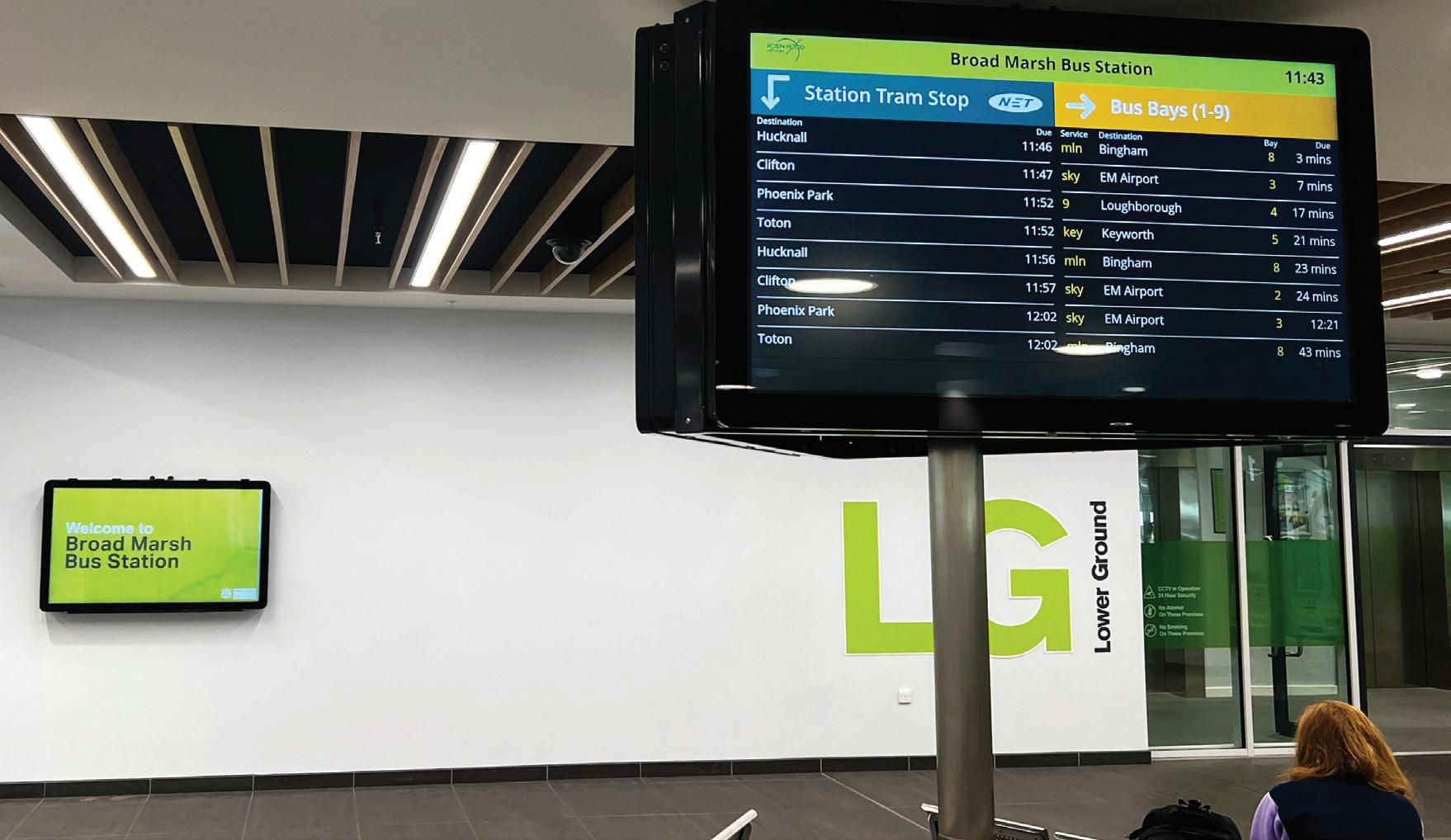
Nine large 65” screens, visible from almost anywhere in the station, show clear information about all routes and destinations.
the use of public transport.
The new suite of digital tools will enable the council to reward greener travel choices with easily redeemable incentives, fully integrate micro-mobility options into the existing public transport network and provide unbiased real-time journey information to passengers. In a first-of-its-kind ethical approach for mobility services, this will all be delivered through existing messaging channels such as Messenger and WhatsApp, eliminating the need for an app, and with no location tracking or harvesting of personal passenger data.
As part of the roll-out of the technology, Zipabout will also provide the council with full access to data to better understand real-time transport demand in both urban and rural areas across the region. The behavioural insights will be used to plan public transport networks based on actual traveller need, solving current challenges around over and under-used bus and train routes. By vastly improving the public transport experience, the county aims to encourage residents out of their cars and achieve sustainable behavioural change.
In a unique collaborative approach, the technology platform will support and enable the services offered by all transport operators and mobility providers in the region, such as Oxford Bus and Voi e-scooters.
Cities around the UK are being encouraged to follow
Oxfordshire’s lead and adopt the technology, which is being offered free to all local authorities “to encourage genuine long term innovation”. Oxfordshire will become the founding member of a new knowledge network, set up to enable cities and regions to identify common transport challenges and share best practice.
Councillor Andrew Gant, Oxfordshire County Council’s cabinet member for highways management, said: “It is vital that we can provide people with information that shows the benefit of cycling, walking and public transport, and we hope it will help more people move away from car use ... Technology that is driven by data to encourage positive behavioural change away from cars is something we are keen to promote and champion.”
Alex Froom, CEO of Zipabout, said: “Predicting demand is the starting point to solving this mobility crisis. Knowing where people want to go, what their intent is, and when they want to travel is vital to understanding the issues that an urban area faces.”
The system includes interactive screens and kiosks showing real time travel information
INNOVATION & TECHNOLOGY www.passengertransport.co.uk 21 October 2022 | 15
“We hope it will help more people move away from car use”
JONATHAN BRAY
Lessons from the Covid experience

The inquiry into the UK response to Covid is is only seeking evidence by invitation. So here’s my unsolicited viewpoint
Winter is on its way. And there are plenty of things to worry about other than Covid as our place on the surface of Planet Earth tilts away from the sunshine whilst we experience the unsettling feeling that our human affairs are slowly spinning out of control. But whilst Covid has slipped out of the headlines it’s important that we learn the lessons about what happened in the transport sector in those dark Covid days of recent winters past. After all, it was an unprecedented emergency response to what was an unprecedented national crisis.
And in our interconnected world, and with Covid still prevalent, who is to say we won’t be back there (or closer than we would like to be, one day)? Or that some other ‘black swan’ event isn’t waiting for us?
Although the overarching and very wideranging inquiry into the UK response to Covid-19 is now underway it is only seeking evidence by invitation and so far the only other contact I have had on this has been via the excitable ‘disruption’ community on how technology could have been utilised better (which is a sideshow). So here’s the short version of the unsolicited viewpoint from someone who spent his Covid times, one 45-minute Teams call at a time, all day, every day, trying to do my bit to help our members keep the wheels turning.
Firstly, any critique of what happened needs to accept that it’s hard to point to any country in the world where there’s consensus that
they consistently got it right - throughout. Because making the best decisions all of the time, in such extraordinary circumstances, and with so many unknowns, is impossible (notwithstanding that even a good call has so many downsides). But on balance I side with the maxim of the Seoul Transport Authority that ‘an excessive response is better than a sluggish response’ (though perhaps I would change the word ‘excessive’ to ‘rapid’).
Time and again during the crisis there was a realisation that something previously unimaginable was going to have to happen soon. But then everyone froze whilst everyone waited for someone to make the first move.
For example, it is hard to believe now but there was a high-profile scrap for quite some time on face coverings - with the mayors ahead of the game on arguing that they need to come in and with the government and industry (largely) pushing back (admittedly in the context of what the WHO was saying at the time).
Another example was how long everyone focussed on surface transmission of the virus when you didn’t need to be an expert to twig
that Covid isn’t crawling around on surfaces, it’s airborne. This meant the focus on the trickier issue of airflow and ventilation didn’t come till relatively late in the pandemic even though airborne transmission was the main way people were catching Covid.
If South Korea was at the ‘go big, go early’ end of the spectrum then perhaps the UK’s response could best be characterised as in the British comfort zone of muddling through.
Other than our natural penchant for muddling through, a big factor was that the Treasury was constantly issuing ultimatums to the virus; that it needed to be reasonable and accept that on fiscal grounds a time limit needed to be set on the pandemic. The virus consistently took no notice but still we were all locked into a nonsense dynamic that the pandemic was going to end when Treasury bean counters decided - rather than when the worst of Covid finally burnt itself out of its own accord.
The pandemic also brought out other faultlines too. Rail’s status as the favoured mode of public transport within government as a whole was clear from day one - demonstrating the fact that heavy rail was the first to get an emergency funding deal. Demarcation of the modes isn’t as big a problem in London as Transport for London is the single voice of truth. It’s not great though in the big urban areas outside London where there were numerous examples of mismatched messaging for the public with the Cabinet Office, Rail Delivery Group, individual bus and rail operators and transport authorities all competing for the public’s ear. What was particularly frustrating was how far into the pandemic it was before heavy rail and local transport was even in the same (virtual) room. Indeed, we had to self organise interplay between RDG and Urban Transport Group around key issues like messaging to the public, and we never got to the stage where all the main players in the UK (RDG, Confederation of Passenger Transport, UTG, Department for Transport, Transport Scotland, Transport for London, Transport for Wales, Translink) were brought together.
A further consequence of the Treasury’s refusal to accept that one of the government’s key roles is precisely to act as our collective national insurance policy in times of crisis (that’s why we give them so much of our money), and to respond accordingly, was that
“It is hard to believe now but there was a high profile scrap for quite some time on face coverings”
16 | 21 October 2022 www.passengertransport.co.uk COMMENT
The mayors were ahead of the game on arguing that face coverings needed to come in while the government and the industry pushed back

the wider approach to the crisis was to patch and mend our way through it till we could get back to ‘normal’. This was particularly apparent with the funding deals for local public transport which lurched from one cliff-edge deal to another (and in themselves were top-ups for existing failed and broken funding arrangements). Not only did this divert significant senior management time away from dealing with other key aspects of the crisis, but it also represented a missed opportunity to ensure a more effective and coordinated response which made the best use of the totality of the funding being pumped in.
Having said all this it’s right to recognise how hard local transport officials at the DfT worked (within the context they found themselves to keep the show on the road) and in particular got behind the funding case to other parts of Whitehall for local public transport. We also had very good engagement throughout the crisis which - although stopping well short of coproduction of solutions - was vital in ensuring
that despite all the challenges the wheels did indeed keep turning throughout the crisis.
It’s important too to reiterate that in a crisis of this magnitude a good enough response is an achievement in itself.
There’s much more that could be said about the transport sector’s Covid response and I hope at some stage there is a transport-specific strategic lesson-learning exercise before memories fade because it would be fascinating to know what others think too. But here are four takeaways from me for starters.
Firstly, go big and go early in the response.
Secondly, there is more scope for co-design with the regions in a national emergency response than we witnessed.
Thirdly, if we are sticking with modal divisions at the DfT (and there are respectable arguments why this should remain the case) local transport should be given the same status and importance as heavy rail and extra attention should be given to the interplay across modes (particularly for the largest urban areas outside London).
Fourthly, defaulting to patching and mending policy till things get back to normal during a crisis of this magnitude is an understandable impulse. But a crisis should also be an opportunity to make the kind of changes that were long overdue. ‘Never let a good crisis go to waste’ was a phrase used often during Covid, but other than Number 10’s Andrew Gilligan attempting to put rocket boosters on cycle use by mandating temporary cycle lanes for office workers, was it acted upon?
And as for getting back to normal. As we are now finding out there never was going to be normal to get back to…
ABOUT THE AUTHOR
Jonathan Bray is the director of the Urban Transport Group. Throughout his career in policy and lobbying roles he has been at the frontline in bringing about more effective, sustainable and equitable transport policies.
“I hope at some stage there is a transport-specific strategic lesson learning exercise”
www.passengertransport.co.uk 21 October 2022 | 17
ALEX WARNER
Could SQRs squashtrue customer care?
I initially lauded the railway’s new Service Quality Regime but I now fear it is too rigid and will constrain innovative thinking
The Service Quality Regime (SQR) which was established by the Department for Transport to monitor the customer service performance of train operating companies has been in place for around a year. Readers of this column may recall that I lauded its inception at the time and claimed it could be a “game-changer” (PT239). 18 months on and I have mixed views.
For starters, in some cases, SQR measures the wrong things - it looks for quality in assets and often these are not what customers notice. Paint and décor are not considered, even though these tend to have the most immediate impact when a customer sets foot on the railway. A slightly damaged seat fabric will fail the SQR test, but an armrest that has been completely destroyed by catering trollies and clunky luggage isn’t included. Acceptable wear and tear tolerances are way over what a customer considers acceptable, so there were too many failures, such that the results weren’t published because they would have been too damning. I gather the scheme was then changed to avoid embarrassment. The regimes are also adjusted to account for things that can’t easily be fixed both from a practical and financially viable perspective. SQR inspectors ask their bosses why they are bothering as it is so pointless.
Analysis of SQR measures against the drivers of customer satisfaction illustrates that there is little correlation until way down the list of customer priorities. The strict requirements make it inefficient. It makes sense to sample
at different times and days but achieving strict requirements to do this drives up costs. For example, inspectors are mandated to make only one vehicle visit per train. Why not do every carriage as half the cost is in getting to the train? They also have to visit every station every quarter (or per period on smaller TOCs). This is actually random, so an inspector could visit a station twice in a few weeks or almost six months apart. Visiting every period is pointless, as most things won’t have changed that rapidly and is it really worth checking small, remote stations at the same frequency as the biggest stations? There are some nuances in the regime that allows for this, but not in all and they are not consistent.
The DfT insists that the management of the

regimes is truly independent, however, they deal directly with the TOCs and therefore opportunities for the supplier of the SQR regime to talk to the DfT only occur via the train operator. The way the contracts work also means there is a perverse incentive for the supplier to look after the TOC, rather than be truly independent. I’ve presided over an SQR scheme since last October and my customer is the TOC and it is them I grovel around.
The role of the central SQR team (now in excess of nine people) at the DfT is interesting. A cynic would suggest that they are merely policing the arbitrary requirements and inevitable action plans from things that repeatedly fail and the Treasury can’t fund the solution for! It genuinely doesn’t feel as if anyone in the industry is looking at the detail and making sure the findings are built into future strategy and station and train design.
TOCs will likely attempt this on the basis that their scorecard performance could probably be improved by it (if they join the dots of course), but how much influence does a TOC have on train specification in reality? Their influence, I’d suggest, is paltry and especially so now that the DfT takes more responsibility for the specification of the customer product.
Network Rail certainly won’t be thinking about using SQR to inform future station designs.

The DfT doesn’t seem to be looking at anything beyond the headline SQR results, so is the data being gathered and actually analysed with an eye to driving customer satisfaction?
The regime seems to focus, in a rail industry way, on ‘blame’, rather than ‘innovation’ and ‘improvement’. I’m yet to hear of a TOC proactively assimilating and analysing SQR results alongside other customer insights to create the fullest picture and build the totality of data into a Customer Service Action Plan.
There are dedicated teams to manage SQR in each TOC as well, but their time is invested almost entirely in administrating the scheme and ensuring all the surveys are done. Imagine if, along with their counterparts at the DfT, they were reallocated to tasks that involved proper trend analysis and driving more fundamental improvements in customer service.
Whilst I think some form of SQR or mystery shopping is required, the industry should extricate itself from its binary, black-and-white obsession and focus more readily on customercentricity. It would be great if the sector could
LNER’s new Family Room at Kings Cross is an example of pro-active and innovative customer service
18 | 21 October 2022 www.passengertransport.co.uk COMMENT
focus on customer-emotional intelligence aspects, on ambiguity - stuff that isn’t defined as compliant or non-compliant, pass or fail, but training and encouraging management and frontline employees to anticipate and identify current and future customer needs in ‘real time’, to assess different customer segments and the nuances of situations in a more tactical and empathetic way. Train companies, as a whole, both strategically and on a day-to-day basis, should ‘read the room’ in terms of their communications and behaviours, toning down or up the messaging whilst reflecting on the kind of service they are providing, not just measuring it by box-ticking surveys.
Last week, I chaired the West Midlands Grand Rail Collaboration Board and we had a great paper reviewing the Commonwealth Games, presented by the impressive Lucy Wootton who heads up the alliance. I was keen to commission this review because it was obvious some really good work had been undertaken and I wanted us to ‘bottle it’ for deployment as ‘business as usual’ as well as learn from any shortcomings. The problem with events such as these is that everyone rightly gets worked up into a frenzy and the collaborative behaviours and relentless focus on ensuring everyone are happy - customers and staff - is seen as only needing to apply right up until the closing ceremony. The paper remarked that ‘doing the right thing for passengers’ was a key positive aspect to emerge from the Games. My question, was why shouldn’t the philosophy be omnipresent, even on a wet, dark November morning? It shouldn’t need a Commonwealth Games, for top brass and their teams to collaborate either on the platforms or in a shared control room or on conference calls. We mustn’t now go into the usual monotone, mundane, automated, rigours of railway life with all its lines of demarcation and thinking outside the box is discouraged now that summer is over and all the frivolity of the Commonwealth Games is a mere halcyon memory.
In my musings about customer-centricity, I reflected, once again, on all those consultancy assignments or conference speeches I’ve made about those great service sector providers where the messaging around customers has flair, is instinctive and sincere and is reflected not just in the marketing guff but on the frontline. “Why can’t we be like Pret a Manger, John Lewis, Disney or Apple?” I would
implore, often to an audience that knew I was right and would love to do this but realised that their corporate structure just wouldn’t get it.
The problem is that often we make excuses why the service genre at these top brands isn’t replicable in the railway because the infrastructure is different, the clientele more varied and challenging, for all sorts of societal reasons, and the distressed nature of travelling - particularly to work - means that a happy-clappy environment may be more challenging to pull off. The fragmented nature of the industry and the suffocating grip placed on train companies by the DfT and other stakeholders means that even Mickey Mouse wouldn’t have a free run at delighting customers if Disney were running your local station. However, there’s nothing to stop us from trying to understand and emulate what it is about the corporate psyche and customer service strategy at these best practice companies and also identify those everyday customer-centric traits that are then exuded on their ‘frontline’, which can be replicated on our own stations and trains.
There will be many initiatives and behaviours that can be deployed on our shop floor or translated in some shape or form. The problem is that in this ‘black and white’ railway mentality, we just think we’ve nothing in common with the kind of environment that non-transport providers operate within and the shutters come down. A world where SQR and other equivalent schemes across the range of railway disciplines prevail, and where the commercial ingenuity and ability to create a customer service proposition is taken away from the local operator and shoved into some overwhelming, remote central monolith, is one which over time instinctively saps the creative juices and leads to dull, text-book automation that serves little if any benefit to customers. ‘Trailblazing’ isn’t a term synonymous with the railway these days, but in the future, it needs to be.
Thankfully there are exceptions like LNER, which has a strong branded customer proposition and is a laboratory for flexible and creative customer service ideas. It’s perhaps only coincidental, that LNER does not use the DfT SQR regime, preferring instead conventional mystery shopping and a customer-led customer satisfaction survey. Alan Riley, head of stations, and a cerebral innovator within the sector, was a leading light
behind the opening of a Family Room at Kings Cross, complete with a fantastic model railway! This initiative is exactly the sort of proactive, innovative thinking that is a trait of a truly customer-centric company, where dreaming up ideas is seen as a good thing. It’s an example of what can genuinely be achieved within the remit of your average and ambitious station manager and their team.
What a sight King’s Cross was last Friday afternoon - The Flying Scotsman puffing smoke and whistling on the platform, heritage displays, competitions, a Hornby stand with a model railway to accompany the seaside display in the new lounge. And, get this, everywhere, customers were happy and had a spring in their step and there was a real buzz, with photos being proffered by joyous customers all over social media. Free-thinking initiatives like this, which show that the railway knows exactly what evokes positive emotions among its customers, do much more good than the million SQR audits that will have been carried out these last 12 months.
Perhaps the solution is for the government to finally show conviction to try to attract the leading light, out-of-sector, customer-centric service providers. Is it really dreamland to think that some of those household name brands could be enticed to help run a railway? They don’t necessarily need to be the majority owner and could just have a slim share, but enough to infect the minds of everyone in the organisation with their obsessive and all-embracing approach to adding value to customers.
With the future Passenger Service Contracts ensuring that train companies focus on nothing but customer service, without the distractions of the current and previous contractual regime, the opportunity is less onerous for a new player, but it’s important that the regime isn’t ‘black and white’ - it must give the flair playing luxury hotel chains, restauranteurs, entertainment providers and retailers the space to innovate and not be constrained by overly deferential box-ticking. Heaven knows what they’d make of SQR in its current format, though.
ABOUT THE AUTHOR
Alex Warner has over 29 years’ experience in the transport sector, having held senior roles on a multi-modal basis across the sector
“It would be great if the sector could focus on customeremotional intelligence aspects”
www.passengertransport.co.uk 21 October 2022 | 19
Let’s listenactually to each other
Throughout October many of us have celebrated Black History Month, a time of national celebration to honour the achievements and contributions of black people.
Our people are our greatest assets
Throughout this month, it is important to reflect on how vast the contributions of our black colleagues across the transport sector have been. A large portion of black colleagues came into this industry, post-World War II to help rebuild the country, dubbed the
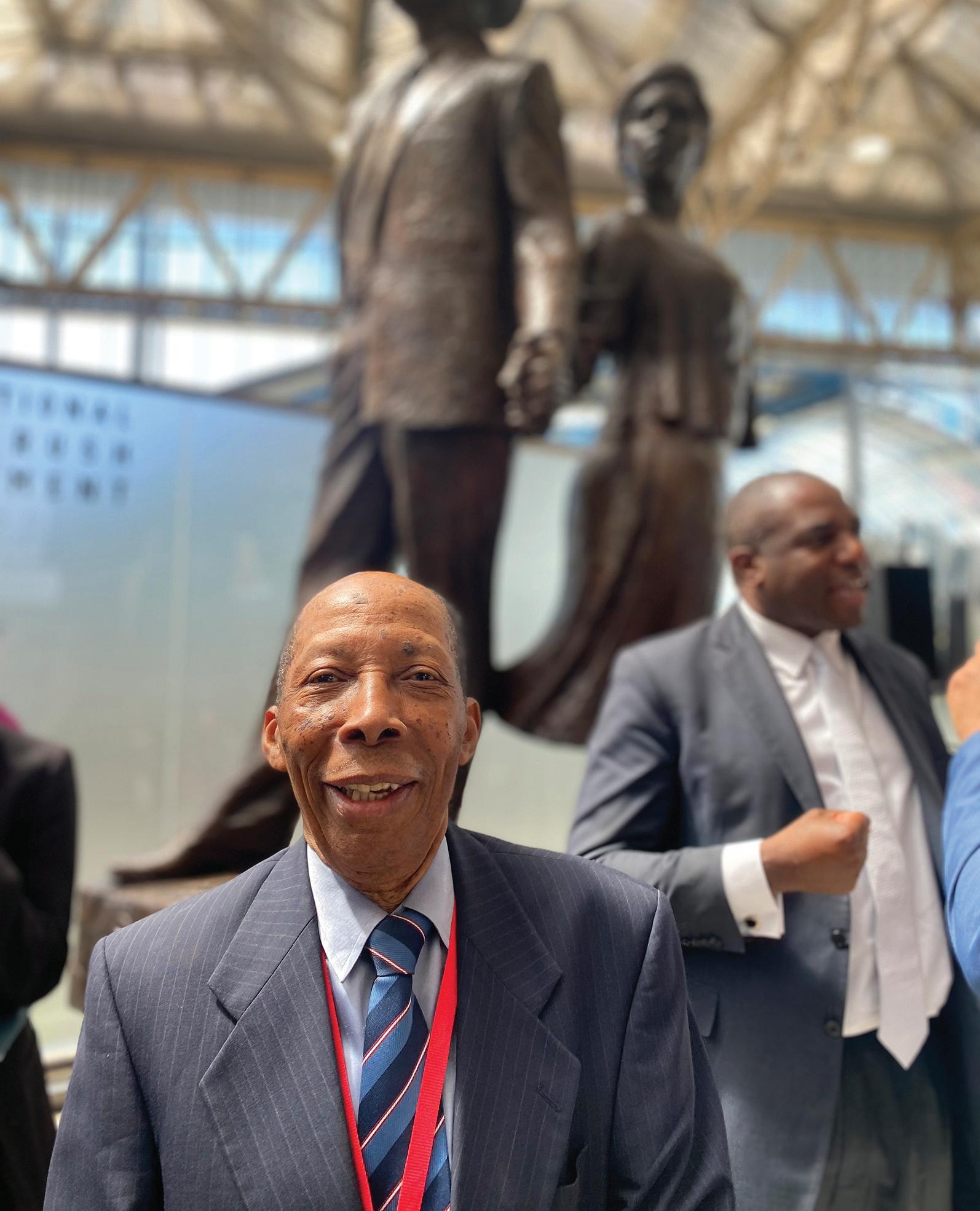
Windrush generation. They came at a time when racial tolerance and understanding were still in their infancy, and many paid the price.
I very often think about the collective strength, sheer resilience and determination needed by trailblazers like Wilston Samuel Jackson (Britain’s first black train driver), Trudy Aarons, (Britain’s first black female train driver), Barrington Young (Britain’s first black train inspector) and Siggy Cragwell (GTR superstar who at 82 years old is still working on the railway).

Our people are our greatest assets in this industry. In moments of crisis, they work tirelessly to keep the railway running, getting people to their jobs, goods to supermarket shelves and connecting friends and family. Could you imagine doing this, while experiencing racist abuse, microaggressions, or feeling isolated and marginalised from your colleagues and/or passengers?
The last two years have opened people’s eyes to racial injustice and intolerance across the world. The disproportionate death rates of Black people at the hands of Covid, the murder of George Floyd, and most recently Chris Kaba, remains a sobering reminder of this. Specifically, in the death of the railway frontline worker Belly Mujinga, who during the height of Covid was allegedly spat on by a passenger, frightens me to my very core.
Everyday heroes
Traditionally, Black History Month in October has quite rightly celebrated key figures and events in Black history. This year, I would love for the industry to go beyond that and recognise the achievements and contributions that black people make every day. It is those everyday heroes that need recognition.
For me, this is giving thanks to my first manager within GTR, Tina Owusu, who gave me unwavering confidence and belief in myself and showed me what it is like to be a true leader in the railway. She, through to Tonderai Matizha-Johnson, who most recently gave me a platform to speak to colleagues within GTR about race. An opportunity I was so incredibly grateful for, and something that would have otherwise been completely inconceivable to somebody like me, who struggles at times with their self-confidence. They both made me realise just how powerful my voice could be and
Black History Month is a time to champion the black community. Join in and use this opportunity to make a difference to our sector
Nafisa Nathani
Thameslink’s Siggy Cragwell, pictured in June at the unveiling of the National Windrush Monument at Waterloo Station
20 | 21 October 2022 www.passengertransport.co.uk COMMENT BLACK HISTORY MONTH
how speaking my truth it can help others, as we all fight for a collective future in this industry.
I cannot forget my support network within Network Rail, my Cultural Fusion ladies: Judith Ibukunlayo, Sharon Salmon, Sonia Hazel and Ibtisam Saeed. Through their friendship, they have each shown me that I am enough. That I don’t need to seek permission or external validation from others, and that it is absolutely fine to be unapologetic, within reason, about who I am. They have each provided me with the tools I need to challenge certain behaviours with grace, dignity and respect. I will always use these ladies as my sounding board, and I very often feel I am completely undeserving of their friendship.
And not forgetting, my forever TSSA rep, Dwain Jones, who always answers my phone calls, never leaving me hanging, whatever time of day. He is someone who I rely on as a true veteran in this industry, to help explain things that might otherwise be completely alien to me. I value his levity and humour most of all. He is someone I know I have a bond with for life.
These are my everyday heroes!
Listen, learn, grow, and improve
After near enough a decade in the private sector, I’ve been lucky to have the experience of working for two great employers in the railway: GTR and Network Rail. I’m not saying that either is perfect or doesn’t have its blind spots (particularly around race), but whenever I have raised anything, individuals within these organisations have committed to setting things right.
I have felt supported in challenging non-inclusive behaviours or outdated processes. They both have listened, learnt, and grown from conversations and ultimately improved. This commitment, I believe is what sets employers apart from one another, particularly in today’s age of ultra-transparency.
Food for thought
Throughout this month at Network Rail, our race equality network, Cultural Fusion, has hosted a variety of events, for colleagues across the rail sector to join. This has included tea-break sessions on allyship, discussions around intersectionality with change-makers like Nimko Ali OBE, celebratory ‘one-pot’ parties for teams to break bread over lunch, as well as webinars
with healthcare experts around mental health and safeguarding fears pertinent to the black community.
Did you know that black people are four times more likely to be detained under the Mental Health Act than their white counterparts? This isn’t that well known, and more often than not, the mental health support required from those within the black community, particularly black men, desperately needs to move away from a crisis-driven response to a more compassionate dialogue through the building of trusted partnerships with figureheads within the community. Black Minds Matter is a wonderful charity that does a lot of great work in this area.
Why not, take Black History Month as an opportunity with colleagues and friends to try delicacies such as saltfish fritters, curry goat, rice n peas, yams or plantain? Discuss food and talk about your own lived experiences and perspectives. I’m personally addicted to Supermalt and Plantain crisps, a new obsession I developed after last year’s Black History Month celebrations.
Food has a wonderful ability to unite people, break down barriers and start conversations you might never have thought about.
Are you listening?
Now, what does it mean to listen to each other? I hear you tell me, that you listen to your colleagues all the time. Well, are you listening, actively listening?
Active listening means going beyond simply hearing the words that another person speaks, but also seeking to understand the meaning and intent behind them. This doesn’t mean, thinking about what you are going to say back in a quick-witted response or snarky rebuttal, but staying in the present moment. This is, remaining neutral and non-judgmental in your responses, helping the other person to feel comfortable with sharing their thoughts, reflecting on what they have said, as well as being patient and not trying to fill in silences with your thoughts or stories.
It takes trust and vulnerability for anyone to share their own stories and moments of vulnerability so openly, so please be mindful of that. From personal experience, I know it can be utterly exhausting. I have come out of conversations, in the past feeling exploited and not heard, as if my trauma was being
weaponised for public consumption, and that doesn’t feel nice. If any of your colleagues choose not to partake in conversations or share their personal experiences, that is fine too. There are so many other ways to widen perspectives such as reading, listening to podcasts, and watching documentaries.
Time to reflect
Black History Month is a time to take stock. To champion the black community, who for so many years have had their stories muted and rendered invisible. We need to shine a light on all those heroes, who have helped, supported, and guided us.
There is real strength in diversity and as an industry, we need to have more conversations (however difficult they may be) to shine a light on the everyday issues and hardships, some of our employees within the sector face.
We spend more time with our colleagues than we do sometimes, our friends and family, so come on let’s all sit down and talk. Our ability and need to listen to each other and learn are what makes us distinctly human, it truly is a mark of our humanity.
I would ask everybody to please think about what you have learnt throughout the month. Have you actively listened to your black colleagues about their lived experiences? Have you read any new books or podcasts that have changed your perspectives? Have you considered how the theme for this yearTime for Change: Action Not Words - might translate into your life day-to-day? Have your perspectives widened due to the talks or events you have attended? What does the pledge ‘see something, say something’ mean to you personally?
Black History Month is important, but so is the rest of the year, as we create new stories and shine a light on the strengths of real diversity in the railway.
It’s time to join in and use this opportunity to make a difference.
ABOUT THE AUTHOR
Nafisa Nathani is Southern Region Lead for Cultural Fusion, Network Rail’s race equality network. Cultural Fusion is open to all those who work in the rail sector. To join, email culturalfusion@networkrail.co.uk
“As an industry we need to have more conversations, however difficult they may be”
www.passengertransport.co.uk 21 October 2022 | 21
NICK RICHARDSON

Heading North tosolve Levelling Up
Levelling Up presents as many problems and opportunities as travelling between the North and South. Where do we start?
Levelling Up has been the mantra for government in response to just about anything. Defining it seems to be elusive in that it is vastly over-simplified into North and South or woolly to the extent that deprivation stretches to include Tunbridge Wells if you include the Rishi Sunak description. Changes in direction have meant that any clarity has now been undermined and Levelling Up can mean whatever anyone wants it to mean.
North and South
Starting with the basics: ‘The North’ is loosely the urban agglomerations of Merseyside, Greater Manchester, Sheffield, Leeds and surrounding areas; note that this area has a greater population than Scotland, Wales and Northern Ireland put together but rather less devolution. ‘The South’ is London and the South East, wrapping up a multitude of economies and populations into a widely despised mass equated with prosperity. On this crude basis, the West of England, East Anglia, the Midlands and the real North fall within whatever definition is convenient or are simply overlooked; over-simplification gives rise to misapprehensions worthy of Dick Whittington. As far as transport goes, Northern Powerhouse Rail (NPR) and High Speed Two reflect current thinking. NPR has had a chequered history of approval casting off parts of the scheme and reinstating them, depending on who appears to be in charge. When governments start poking around to
reduce the scope of schemes, they invariably miss the point that the overall scheme benefits are greater than the sum of its parts and that slicing bits off is not proportionate to the consequences.
The role of rail
There are severe constraints on the rail network that NPR is intended to alleviate to the point where economic activity is constrained because access to research facilities and markets is not what it could be. However, this spatial pattern is different to journey to work areas. One characteristic of ‘northern’ urban areas is that they have defined edges unlike many other places where one drifts into another with no discernible
break. Much of the employee catchment is within one built-up area with the result that, for example, improving journey times between Manchester and Leeds is probably less beneficial than improving journey opportunities within the cities. Widening work catchments may have the unintended consequence that regular journeys become longer, not a good scenario for commuters or transport providers.
The continuing saga of HS2 shows that government commitment to a scheme doesn’t guarantee that it will proceed as agreed. Whether for speed and/or capacity, losing the eastern arm to Leeds says a lot about Levelling Up in that selective benefits result. Proper redistribution of activity needs to be based on why people travel rather than a frenzied attempt to join the dots. Reducing journey lengths, especially for regular journeys, coupled with flexible travel options should surely be more important than faster trains to benefit a minority. Thus we have Birmingham Airport vying for consideration as another London airport because it will be as quick to get there from central London as it is to get to Heathrow or Gatwick. This distortion of journey times works in both directions so while it may be desirable to link HS2 hubs to London, it also makes it possible for people in London to live elsewhere, a matter largely dictated by housing costs rather than distance.
The ingredients for good connections include distance, time and cost. Ironically, with HS2 starting from Euston, the problem is getting to Euston through an overcrowded metropolis. Similarly, high speed rail to Europe shows that
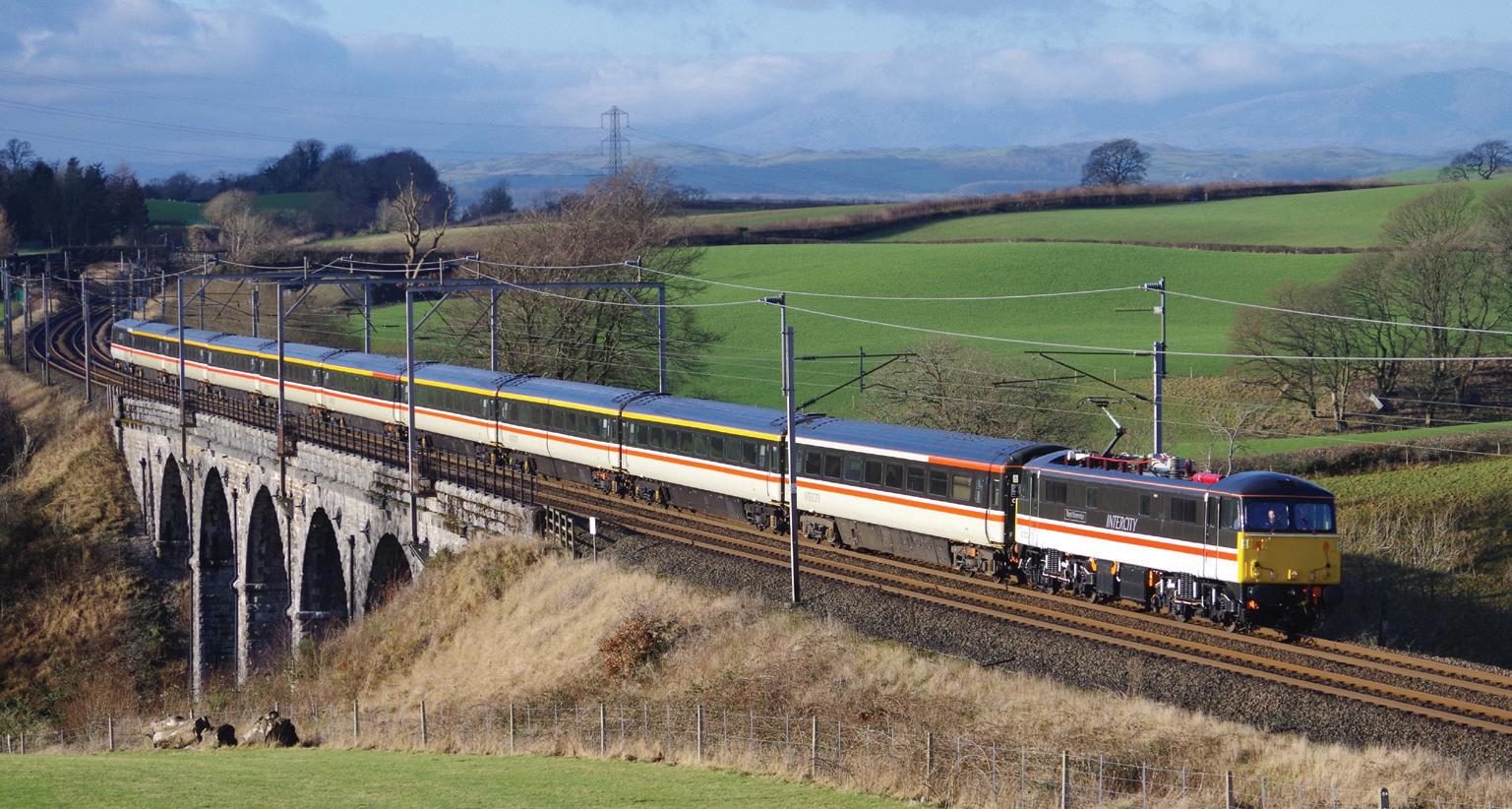
COMMENT
Locomotive Services is operating a weekly train between London and Manchester with old InterCity rolling stock
22 | 21 October 2022 www.passengertransport.co.uk
the journey to get to the starting point at St Pancras International is more problematical that the international part of the journey.
Impossible journeys
Actually getting from south to north has been something of a challenge lately. Avanti West Coast has scored a high profile own goal by providing far fewer trains that it should be. It points towards staff shortages, something which transport operators should anticipate and make provision for. Avanti is throwing in the towel and the West Coast Main Line fiasco means that getting to northern destinations involves unacceptable overloading and a lack of predictability for users. This is a core route for which good performance is essential. However, Transport Focus investigated and found a lack of information, reservations that were not fulfilled, short notice cancellations, trains with standing passengers and cumbersome refund process. Irrespective of the number of trains available, these are matters which could be better dealt with.
Avanti has now adopted a recovery plan with a view to provide more trains from December 2022 but now has six months to prove itself. It’s all rather a mess for what is supposed to be a major artery linking north and south. Likewise, TransPennine Express has adopted an emergency timetable so even if you make it north, east-west journeys are something not to look forward to.
Another option, Arriva CrossCountry also seems to be going backwards. The original franchisee, Virgin Trains, was hopelessly unreliable and journeys from the south to Birmingham created the concept of ‘Virgin time’ which was a complete lack of punctuality. At one time, I used CrossCountry as a connection at Basingstoke. A colleague doing a similar journey noted down the delays out of interest and the train was rarely on time, the best excuse being ‘animals on the line at Berwick-upon-Tweed’. The Arriva takeover offered better timekeeping and more trains, gradually supplementing the core hourly service to various northern destinations.
However, the pandemic seems to have undone everything - a basic two-hourly service has eliminated many connections, and cancelations may mean abandoning the journey altogether. Whether single units operate hourly or combined units operate
every two hours, it results in the same overcrowding. It really shouldn’t be this difficult to get from south to north. The fact that there is only a single track between Leamington Spa and Coventry suggests that reinstatement of a proper main line is long overdue. This route is used by freight trains, CrossCountry and local services and needs more capacity and resilience.
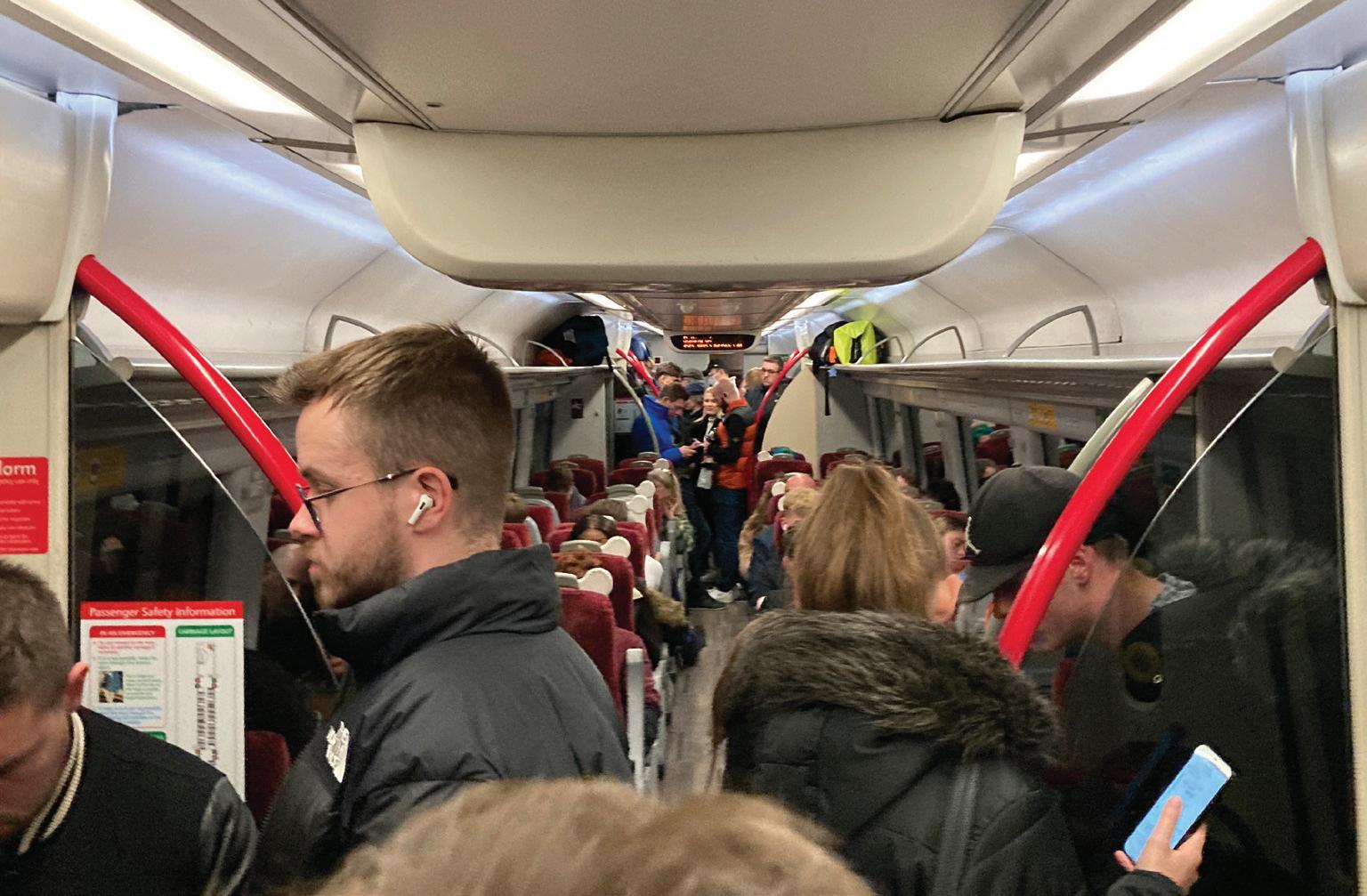
Other possibilities include going to Manchester via Sheffield or Leeds which appear to compare reasonably well on price and journey time but reflect a total failure of the direct West Coast route. However, the East Coast route has a tendency to fall apart if there is any damage to the overhead power lines.
Paying the difference
The other consideration is ticket prices.
Supposedly, CrossCountry is the test-bed for simpler fares. My observation is that its fares have doubled over the past few years. Avanti is worse with anything other than advance tickets being stupidly expensive. A return from, for example Hampshire to Manchester costs upwards of £160 (unless intensive research breaks down the journey into sections with less unappealing prices but which still
costs over £100). A combination of hopeless reliability, uncomfortable journeys and high prices explains why people use cars instead.
An opportunity has arisen for ‘Friday Charter’, provided by Locomotive Services using a 50 year old locomotive which used to work on the route. This operates on Fridays non-stop from Crewe to London Euston and returning to Manchester via Birmingham New Street. It’s First Class only with a single ticket price of £75; this could be cheaper but compared with Avanti, perhaps it isn’t too bad.
A feature of trains south of London is that they generally cost a great deal more to use than most elsewhere. The network is more intensive and has a largely captive commuter market although this has reduced postpandemic. Most services take ages because of the complex routes and multiple stops; to get to London from the south coast takes as long as it does to get from London to Manchester, Sheffield or Leeds. Perhaps Levelling Up refers to increasing fares and making journey times worse.
ABOUT THE AUTHOR

Nick Richardson is Technical Principal at transport consultancy Mott MacDonald, chair of CILT’s Bus and Coach Policy Group and a former chair of the Transport Planning Society. In addition, he has held a PCV licence for over 30 years.
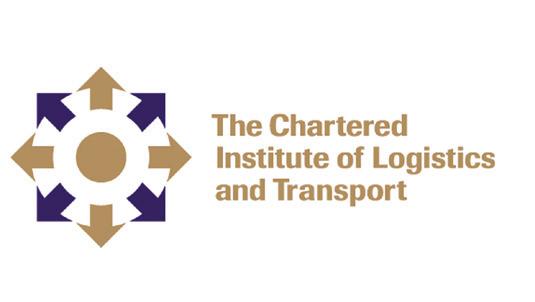
IN ASSOCIATION WITH: www.ciltuk.org.uk Tel: 01536 740100 @ciltuk
“Getting from south to north has been something of a challenge lately”
Problems at CrossCountry frequently lead to overcrowding
www.passengertransport.co.uk 21 October 2022 | 23

Ministers need to clarify the position
Our Whitehall insider imagines what’s going on inside the minds of the mandarins at Great Minster House, home of the DfT
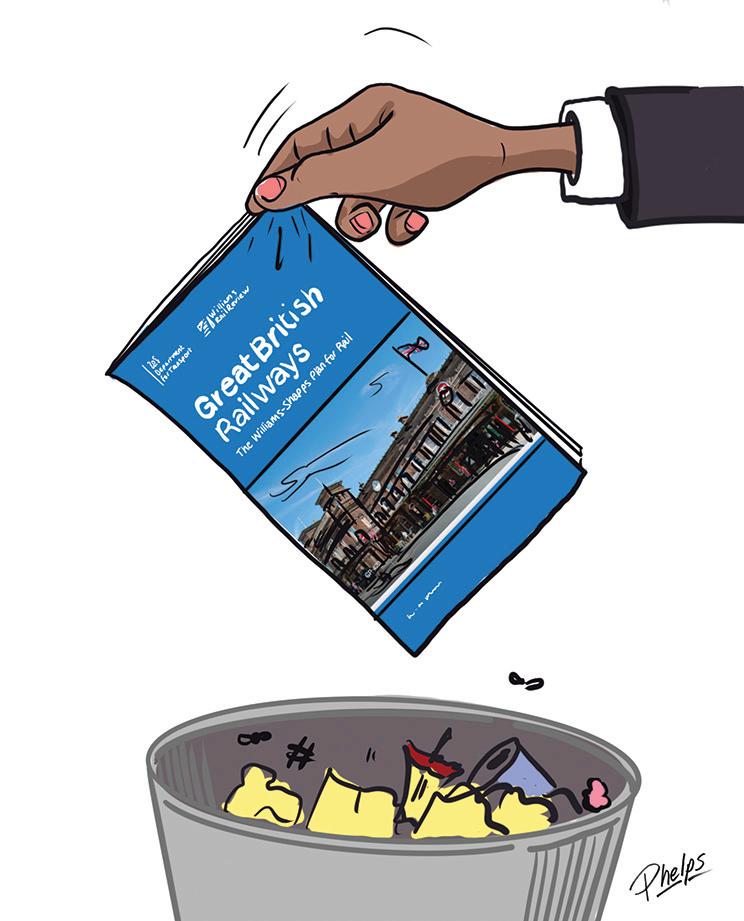
The media is full of stories that the rail reform proposals are, at best, delayed and, at worst, will be scrapped. What a shambles. It’s sobering to think that the rail review was announced just over four years ago to a great fanfare; that it was the most comprehensive review of the railways since privatisation and that it was a “root and branch” review. In his foreword to The Williams Shapps Plan for Rail our former secretary of state, Grant Shapps, said that “wider change on our railways has never been needed more” and that the reforms proposed represented “the biggest change to the railways in 25 years”. The plan was meant to be heralding in a great new golden age for our railways.
Well, it seems to have all gone horribly wrong. As I suggested in my previous column, there’s even talk that the proposed Transport Bill which was included in the final Queen’s Speech back in May may not now be introduced into parliament before the next general election, or may be just a slimmed down bill covering non-rail issues such as autonomous vehicles and e-scooters. Either way, it all feels pretty chaotic. I dread to think how much money has been spent, not only in conducting the rail review in the first place, but on the large numbers of staff and consultants that make up the Great British Railways Transition Team, whose work seems to have been in vain - for now a least.
The speculation about the rail reforms needs to be brought to an end. Ministers need to clarify the position as a matter of
and if ministers instead try and pretend that everything is going smoothly, not only will we lack credibility but the railways will suffer ongoing drift and a serious lack of leadership. But the issue that worries me most is that nobody will be held to account for what appears to be a major failure in policy. The rail review has come up with a set of proposals that appear to be undeliverable either in whole or in part, and the individuals responsible have either moved on or won’t be held to account - least of all Keith Williams himself. I’m betting Grant Shapps is now rather relieved that he’s no longer transport secretary!
urgency. Indeed, I thought it was strange that they didn’t come under far greater pressure to clarify the situation during Transport Oral Question Time on October 13. As I recall there was only one question specifically on this issue from the Labour frontbench which I thought our new minister of state, Kevin Foster, dodged pretty comfortably.
If we are going to execute a u-turn on our rail reforms - and u-turns are becoming a creature of habit with this fledgling administrationthen surely it’s best to get the announcement out as quickly as possible to end this damaging speculation, and just as importantly to explain what’s gone wrong! Unless we do,
Yes, I know it’s very easy to be critical from the comfort of my armchair. I understand that, and I have no desire to be gratuitously unkind. But come on. By any definition, if the speculation is correct, then something has gone badly wrong, and holding people to account is important. The lack of accountability for policy failure is something I’ve moaned about before, and it remains a problem.
Meanwhile, as I write, news is breaking of major cuts to bus services in the West Midlands and South Yorkshire. The day of reckoning on service cuts, which I and others have been predicting for some time, appears to be drawing close - or is already upon us. The issue of cuts to bus services was raised on more than one occasion during the recent Transport Oral Question Time. I’m not sure that ministers did much to reassure MPs that they had a plan to ensure that major cuts can be avoided. Naturally, they cited the amount of funding that has been provided to support bus services, but the reality is that this simply isn’t enough to maintain current service levels. Mind you, since buses are a local service, I can see an argument for saying that local authorities can raise the necessary money to maintain current service levels though increases in Council Tax. Why should the government and national taxpayers always be expected to put their hands in their pockets for essentially local services? A harsh line of thinking perhaps, but not without some logic.
I suggested in my last column that for all of their expressions of delight at being made ministers in this department, our new ministerial team would discover that coming to Great Minster House could be a poisoned chalice. I sense that they may be rapidly coming to that conclusion!

COMMENT
“The speculation about the rail reforms needs to be brought to an end” GREAT MINSTER GRUMBLES
www.passengertransport.co.uk 21 October 2022 | 25
GTR is first for equality honour
Rail operator is the first in transport sector to achieve the robust National Equality Standard
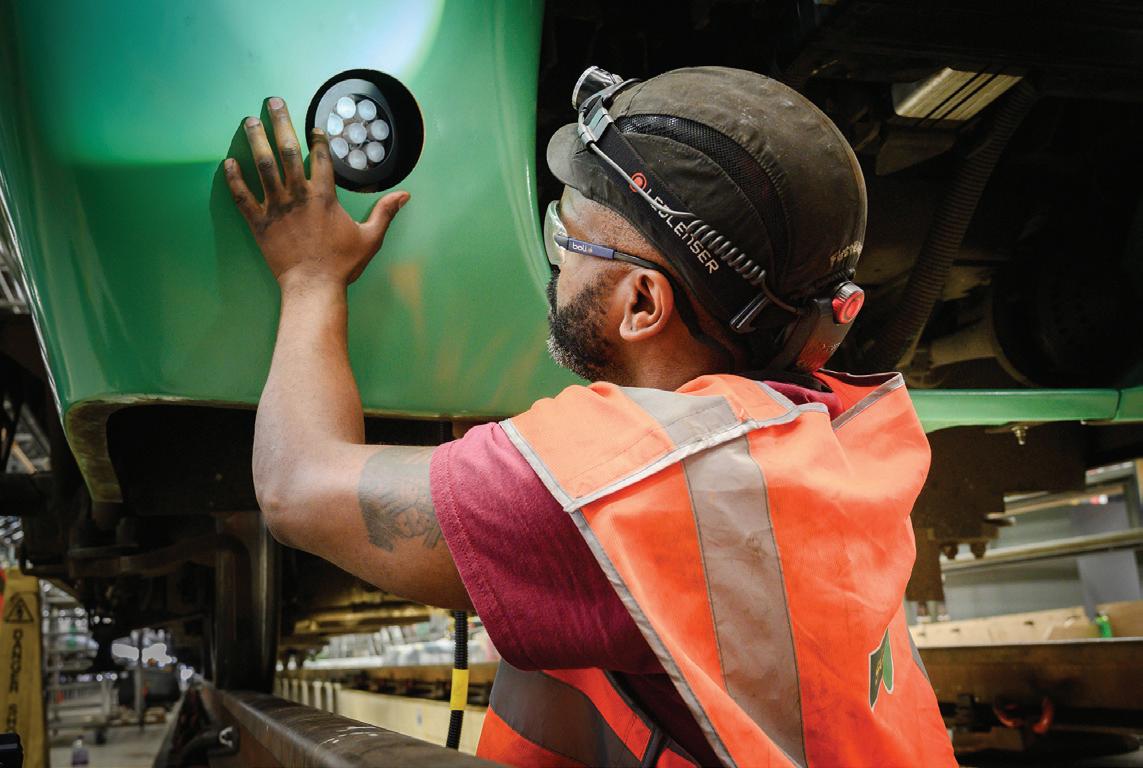
Train operator Govia Thameslink Railway has become the first company in the transport sector to achieve the UK’s National Equality Standard.
Launched in 2013, the National Equality Standard was developed by Ernst and Young UK and sets robust Equality, Diversity and Inclusion (EDI) criteria against which companies are assessed.
GTR’s diversity and inclusion policies were assessed against the 35 competencies contained within the standard’s framework using reviews of evidence, interviews and consultations.
GTR achieved the number of competencies required to meet the standard, and also scored highly in categories relating to strategy and governance, as well as action planning and implementation.
“We’re really proud to be the first transport company to be honoured with this accolade,” said Zoey Hudson, head of talent,
diversity and inclusion at GTR. “Over the years we’ve worked hard to make our workplace as fair as possible, and we welcome people from all backgrounds with open arms. Of course, there’s always more to do, but this accreditation demonstrates our commitment to equality and building an inclusive culture.”
Ernst and Young identified good practice with policies such as unconscious bias training for all hiring managers, engagement with employee networks, a robust coaching and mentoring programme and active community social responsibility actions.
Jelena Eremic Newson from EY UK said:“GTR has put substantial effort into diversity and inclusion activities over the last few years and this is beginning to have a positive impact. A robust strategy supported by the executive team is driving progress. It is encouraging to see a strong commitment.”
APPOINTMENTS
AJW EXPERIENCE GROUP Passenger Transport columnist, Alex Warner has cofounded AJW Experience Group with serial transport entrepreneur and former First Bus managing director Giles Fearnley
The new venture aims to create a series of ‘start-up’ business units, the first being Great Scenic Journeys, a marketing service to promote, accredit and drive customer satisfaction for the many scenic transport routes across the UK and beyond.
Further products and services will be launched with entrepreneurs over the coming year as the business targets growth primarily in the transport and leisure sectors.
Warner (pictured) sold his consultancy, Flash Forward Consulting, to Tracsis Group in 2021. He is also the chair of the West Midlands Grand Rail Collaboration and chair of Surrey F.A., part of the Football Association.

ITO WORLD
Transit data and tech company Ito World has announced Deborah Kobewka as its new chief executive.
Kobewka (pictured) succeeds Johan Herrlin and brings to Ito World over 35 years’ experience in data and analytics in the UK, USA, Europe and Asia, across the private and public sectors.
FLOWBIRD
Flowbird Group has announced Bertrand Barthelemy is to step down as chief executive after 12 years. He will be succeeded by Frédéric Beylier.
Beylier (pictured) was previously deputy managing director and a board member for six years at Oberthur Technologies, now Idemia, a world leader in payment, telecommunications, transport, identity and security solutions in the public sector.

He also spent five years at France Champignon, the European leader in mushroom production and sales, where he held the role of deputy managing director.
TRANSPORT FOR LONDON
Transport for London has confirmed a number of new senior leadership appointments.
Following an open recruitment process Rachel McLean has been appointed to the role of managing chief finance officer. She is currently the CFO for Crossrail and finance director for operations. She re-joined TfL from the Ministry of Housing, Communities, and Local Government in early 2020.

Patrick Doig, who has led TfL’s finance team as the statutory CFO, will resume his role as group finance director and will remain the statutory CFO.
GTR scored highly in categories relating to strategy and governance, as well as action planning and implementation
Most recently, she was CEO of pharma intelligence and analytics firm Evaluate Ltd, where she presided over significant growth in revenue and led it through two major re-investments, culminating in a $1.2bn merger with MMIT.
With Andy Lord taking on the role of interim transport commissioner next week following the planned departure of Andy Byford, Glynn Barton has been appointed as interim chief operating officer to cover for Lord. Barton is currently TfL’s director of network management and resilience.
CAREERS 26 | 21 October 2022 www.passengertransport.co.uk

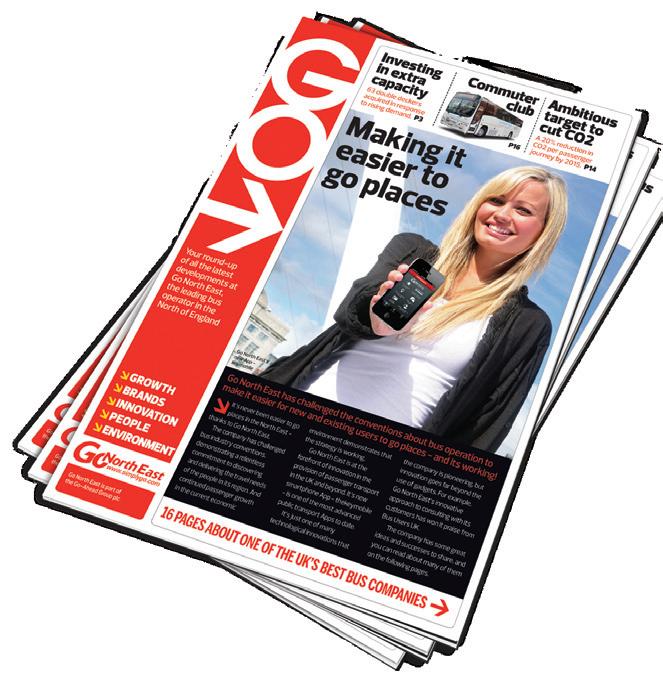
Contract Publishing Our experienced team of transport and publishing experts are available to produce bespoke, high quality publications or copywriting for your organisation. Our rates are very affordable. Email editorial@ passengertransport.co.uk or call 020 3950 8000 or to find out more. To advertise, call now 020 3950 8000 or email the team at sales@passengertransport.co.uk ADD YOUR JOBS HERE CALL NOW TO ADVERTISE 020 3950 8000 or email sales@passengertransport.co.uk www.passengertransport.co.uk 21 October 2022 | 27
Elaine is Merseyrail’s passenger choice
Station retailer wins first passenger award
Train operator Merseyrail celebrated its staff super heroes at a gala awards dinner earlier this month where the first ever winner of a passenger-nominated award was announced.
Elaine Ellis, a station retailer at Town Green station in Aughton, was named as the Customer Star of 2022 at the Merseyrail Achievement Awards.

A total of 168 nominations were received from passengers for the
honour with the impressive list whittled down to a shortlist of three.
One passenger said Elaine was chatty, helpful and always a pleasure to talk to in the morning. Well done Elaine!
ON A B&H BUS OPEN SLEIGH
The nights are drawing in and the festive season will soon be upon us and bus operator Brighton & Hove has confirmed its Santa Bus will once again tour the streets of the city in December.
An annual tradition since 2003, the Santa Bus sees the main man hitching a ride on one of the operator’s open toppers decorated with 10,000 twinkling fairy lights as festive music plays, all to raise money for local charities.
Since 2003 the initiative has raised over £350,000 for charity. Let’s hope the community digs deep again this year!
ZAYAB’S POEM IS ON THE BUSES
Earlier this year the Museum of London, in partnership with BBC100 and Transport for London, launched a a poetry competition for young Londoners to share a short poem on the theme of a London bus journey.
Put your elbow in
METRO PLAQUE GLEAMS LIKE NEW
A commemorative plaque that was unveiled by Queen Elizabeth when she carried out the official opening of the Tyne and Wear Metro in 1981 has been restored to
its former glory.
The brass plate, which is located in the concourse of Gateshead Interchange station, has been given a deep clean, buffed back up to a mirror-like shine, and is gleaming once again.
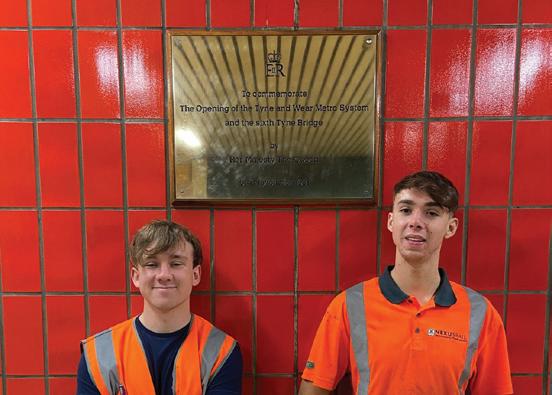
Operator Nexus undertook the work as a mark of respect following the death of the Queen last month and two 19-year old track engineering apprentices - Daniel Noble and Oliver Humphries - were tasked with bringing it back to life. Now after a tin of Brasso and a lot of elbow
grease to remove 40-years of built-up dirt, the pair say you can see your reflection in the plaque.
“Our apprentices have done a cracking job getting it all cleaned, polished, and looking as good as new,” said Nexus customer services director Huw Lewis.
“It now looks exactly like it was that day in November 1981 when scores of staff, media and civic dignitaries gathered to watch Her Majesty officially declare the Tyne and Wear Metro open on what was a historic day for our region.”
Judges have selected 15-year old Zaynab from Tower Hamlets for her poem, A Slideshow of London. It will now be displayed at London bus stops to celebrate National Poetry Day.
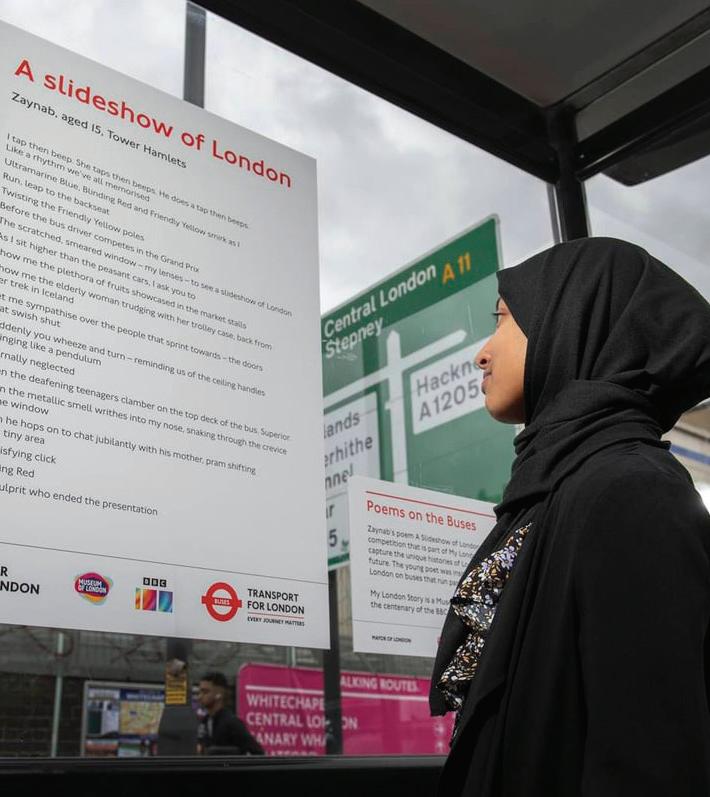
And who can’t be charmed by prose like “I tap then beep. She taps then beeps. He does a tap then beeps.”?
You can read Zayab’s winning poem at bit.ly/3s80VCc.
SEEN SOMETHING QUIRKY?
Why not drop us a line at editorial@passengertransport.co.uk
SUBSCRIPTION ORDER FORM All annual subscription rates include delivery by secondclass post, or airmail for overseas. Please note: At present we are unable to provide printed subscriptions to readers based in European Union member countries. ANNUA L SUBSCRIPTION R ATES 1 year UK: £140 Rest of World: £280 2 year UK: £250 3 year UK: £375 WWW.PASSENGERTRANSPORT.CO.UK N A M E JOB TITLE CO M PANY ADDRESS POSTCODE TEL E M AIL DATE PLEASE START MY SUBSCRIPTION TO PASSENGER TRANSPORT CARD NU M BER SECURITY CODE EXPIRY DATE SIGNATURE I enclose a cheque for £ made payable to Passenger Transport Publishing Limited Please invoice my company (official order enclosed) I authorise you to debit my M astercard/VISA/ M aestro/VISA Electron card. Amount £ PT275 Email: subs@passengertransport.co.uk Return to: Subscriptions, Passenger Transport Publishing Ltd, PO Box 5496, Westbury BA13 9BX
Zayab with her poem
Superstar Elaine!
DIVERSIONS 28 | 21 October 2022 www.passengertransport.co.uk



































